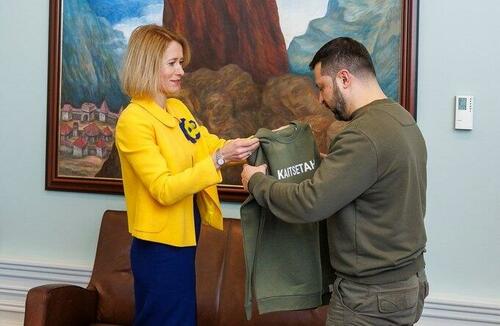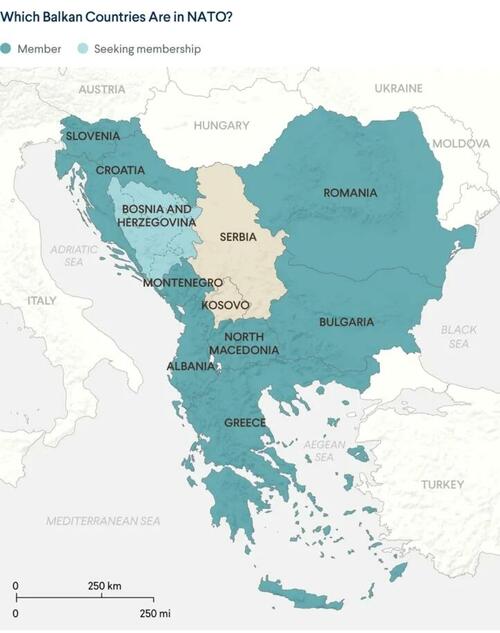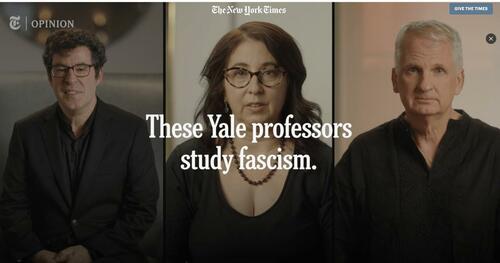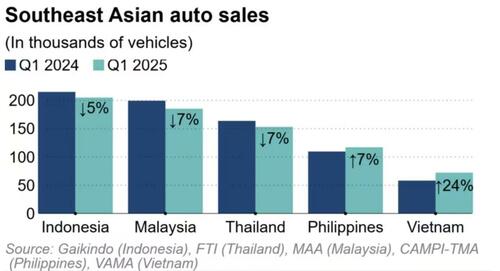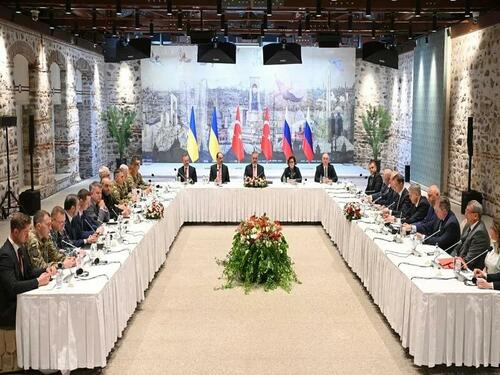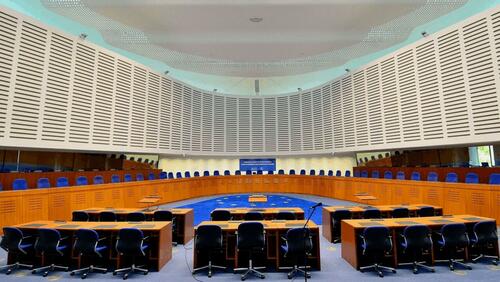Assuredly, the word of truth can be painful and uncomfortable. But it is the way to holiness, to peace, and to inner freedom. A pastoral approach which truly wants to help the people concerned must always be grounded in the truth. In the end, only the truth can be pastoral.
Distinction Matter - Subscribed Feeds
-
Site: Zero HedgeNuclear Names Oklo And NuScale Move Forward With SMR Permitting, PlansTyler Durden Sat, 05/17/2025 - 15:45
Sam Altman-backed Oklo says it is navigating what CEO Jacob DeWitte calls “good uncertainty” as potential Trump administration executive orders could accelerate Nuclear Regulatory Commission (NRC) licensing, expand military and Department of Energy (DOE) nuclear roles, and boost U.S. nuclear fuel supply chains, according to UtilityDive.
On Oklo’s Q1 2025 earnings call, DeWitte confirmed the company is engaged in a “pre-application readiness assessment” with the NRC, aiming to smooth its formal license submission for a newly upsized 75-MW reactor design in Q4 2025. The company still targets late 2027 or early 2028 for first power production at its Idaho National Laboratory (INL) site.
DeWitte noted the recent departure of OpenAI CEO Sam Altman as Oklo board chair removes a potential conflict of interest should OpenAI become a future power customer. Oklo already holds about 14 GW in nonbinding agreements with data centers and industrial operators.
The White House is weighing four nuclear-related executive orders, including directives to overhaul NRC licensing with an 18-month deadline for new applications, reconsider radiation exposure limits, and authorize military and DOE property for reactor deployments—potentially bypassing standard NRC approvals.
These efforts aim to boost U.S. nuclear capacity to 400 GW by 2050, up from about 100 GW today. While the NRC is already implementing changes from last year’s ADVANCE Act, further reforms could shorten Oklo’s expected 24- to 30-month licensing timeline.
The UtilityDive report says that Oklo is also among eight companies eligible for the military’s Advanced Nuclear Power for Installations program, enabling on-base reactor deployments. It’s developing nuclear fuel fabrication facilities capable of reusing spent fuel that would otherwise sit in long-term storage.
Meanwhile, NuScale Power is actively pursuing contracts for its small modular reactor (SMR) technology, targeting a firm customer order by the end of 2025. CEO John Hopkins said the company could deliver an operational power plant by 2030 “if we get closure on a deal here soon.” NuScale is awaiting expected NRC approval in July for its uprated 77-MW design and has 12 modules in production through manufacturing partner Doosan, capable of delivering up to 20 per year.
Hopkins emphasized NuScale’s focus on finalizing real contracts rather than nonbinding agreements, stating, “We’re actually in the process of submitting and negotiating term sheets. We’ve got customers that [want] to … touch steel.” Potential buyers include data center operators, heavy industry, and utilities. CFO Ramsey Hamady added that a signed deal would likely involve multiple parties, including plant operators and tier-one data center or AI developers.
Unlike Oklo’s build-own-operate model, NuScale provides SMR technology and plant services, likening its role to “the chip in the Dell computer.” While NuScale has courted data center customers similar to Oklo, it also promotes its reactors for hydrogen production, desalination, carbon capture, and petrochemicals.
NuScale has about two years of financial runway but expects a committed project to significantly improve its outlook. “We’ll be in a great place if our biggest challenge is keeping up with orders,” Hamady said.
-
Site: southern orders
Then, saying that he has “seen pictures,” (Pope Francis)
regretted the fact that priests still wear vestments with lace: “Where are we? Sixty years after the Council! Some updating [is needed] even in liturgical art, in liturgical ‘fashion’!”
“Yes, sometimes bringing some of Grandma’s lace goes, but sometimes,” Francis told the priests. “It’s to pay homage to grandma, right? It’s good to pay homage to grandma, but it’s better to celebrate the mother, the holy mother Church, and to do so how Mother Church wants to be celebrated.”
-
Site: Zero HedgeDavid Stockman On Why America Doesn't Need "Allies"Tyler Durden Sat, 05/17/2025 - 15:10
Authored by David Stockman via InternationalMan.com,
The title is a bit crude and is deliberately mocking in tone. But it has to be because there is a deeply-entrenched, almost sacred presumption embedded in the nation’s foreign policy catechism that “allies”, “alliances” and “coalitions of the willing” are the be-all-and-end-all of enlightened, necessary and effective foreign policy.
American policy-makers and diplomats perforce should therefore never leave these shores for the wider world without them. This dogma perhaps reached its epitome in Secretary of State James Baker’s “coalition of the willing” during the utterly pointless first Gulf War of 1991 and has plagued us ever since. Unfortunately.
In fact, the truth is more nearly the opposite–so it needs to be stated coarsely, almost defiantly. To wit, allies in today’s world are mostly an albatross, completely irrelevant to the military security of the American homeland and a major source of unnecessary friction and even outright conflict among the nations.
In a word, America is such an outsized economic and military Hegemon that all the little and mid-sized nation’s it has lined-up in formal and de facto alliances are inherently incentivized to pursue policies that minimize their own defense investments—even as they are also encouraged to throw diplomatic caution to the winds. That is, Washington’s “alliances” enable the domestic politicians or elected governments of these small allies to be more aggressive or confrontational vis-a-vis the “bad guys” designated by Washington than they surely would be if operating only upon their own steam.
For instance, the former Estonian prime minister between 2021 and 2024, Kaja Kallas, and now foreign affairs chief for the EU has been a loud-mouthed, vitriolic critic of Russia and hardline supporter of sending other people’s money [i.e. yours] to the support of the equally pointless proxy war against Russia on the Ukrainian steppes.
Of course, with a population of just 1.3 million, GDP of barely $40 billion and armed force of 8,000, Estonia amounts to a cipher of an ally in the scheme of things. So it does absolutely nothing for America’s homeland security, even as it has emboldened Kallas to become a loud irritant to the Big Bear of a country next door.
Then again, if there were no such thing as NATO and the Article 5 military shield of the US, do you think Kallas would be noisily whooping it up for Zelensky? Would her people have tolerated her posturing as little David waving a sling-shot at the Goliath next door?
We dare say the very opposite would have prevailed. Estonia and its leader would have taken care to make nice to their extra large sized neighbor—as small countries have done from times immemorial.
And if making diplomatic nice and conducting mutually beneficial economic commerce wasn’t working for some reason, although it almost always does, they would have been obligated to arm themselves to the hilt. That is, mobilize 10-25% of GDP for defense, if necessary, rather than the pittance of 2.9% of GDP that Estonia actually spends. In turn, that would establish deterrence—the standing up to a potential aggressor the heavy cost in blood and treasure it would be obligated to face in breaching the borders and sovereignty of a smaller neighbor.
And, no, for crying out loud, the 21st century world is not unique when it comes to the relationships between big, small and middle sized nations. What we described above as making nice in diplomacy and economics and making deterrence clear is actually the way the world of nations is supposed to work, and, prior to the rise of the Hegemon on the Potomac, actually usually did.
Most certainly the gods of history have not conferred upon Washington’s politicians and apparatchiks a mandate to befriend and safeguard from one end of the planet to the other every Little Guy from the heavy breathing of nearby Big Guys.
Kaja Kallas on X: “Ukraine’s brave and fierce fight for freedom has been an “inspiration” to the Estonian people. Many have joined the voluntary Defence League.
Indeed, in a world not dislocated by the Hegemon on the Potomac no one would think to describe the reckless foolishness of Kiev in militarily attacking and brutalizing the Russian speaking populations of the Donbas after the Maidan Coup of February 2014 as an “inspiration”.
It was actually stupid beyond belief—something that neighbors not addled by the Hegemon’s military shield or egged on by the CIA, NED, USAID, the State Department and Pentagon would have no problem recognizing and observing.
Indeed that observation applies to the whole passel of little countries that have been admitted to NATO since the turn of the century. For instance, when it comes to the five small Balkan countries that do not even share the Black Sea shorelines with Russia, here is the pitiful military capacity and defense heft (measured as % of GDP) that they bring to America’s homeland security.
In order to put this pittance of military manpower in perspective, moreover, we first note by way of comparison the size of police forces in major US cities. While these domestic police men, women and theys may eat too many donuts on the job and thereby fail any combat readiness tests, when it comes to sheer human muscle the city police forces listed here outrank most of what these Balkan “allies” bring to the table.
Size of Police Forces In Major US Cities:
- New York City: 36,000.
- Chicago: 13,100.
- Los Angeles: 10,000.
- Philadelphia: 6,500.
This is by way of saying that all of the above cities have bigger forces of men in blue than do most of the small the NATO allies depicted below, where we show their active military manpower and their defense spending as a % of GDP.
- Croatia: 14,300/1.8% of GDP.
- North Macedonia: 8,000/1.7% of GDP.
- Slovenia: 7,300/1.5% of GDP.
- Albania: 6,600/1.7% of GDP.
- Montenegro: 2,350/1.6% of GDP.
Clearly, these countries are not shaking in their boots about the Russian Bear. In the most recent year of red hot proxy war between NATO and Russia on the hapless steppes of the Ukraine, none of these five even bothered to spend 2% of GDP on defense!
Indeed, even the bigger fry positioned cheek-by-jowl with Russia on the Black Sea didn’t evince any greater fear of the Bear. Romania spends only 2.2% of GDP on defense and its voters just elected a president who wanted to make friendly with Putin—which democratic chosen leader was, of course, ixnayed by Romania’s “allies” in Brussels and Washington.
Likewise, Bulgaria spends but 2.2% on defense, as well. And, understandably, Serbia has not even seen fit to join NATO. Well, not since its capital was bombed to smithereens in 1999 by NATO war planes, owing to its insistence that Kosovo not be severed from its sovereign territory owing to the writ of Bill and Hillary Clinton.
Even then as Russia’s firm ally in the region, Serbia spends about 2.3% of GDP on defense and has about 28,000 active men in uniform in its armed forces. That is, Serbia’s neutral forces total about the same as the combined military might of the five small fry on the Adriatic side of the Balkans.
Moreover, it also turns out that these five wee NATO members actually spend about the same pittance for military capabilities as is hoovered-up by Ukraine-bordering Hungary and Slovakia. The former spends about 2.0% of GDP on defense while the latter’s military spending is 2.1% of GDP. Yet both governments next door to the Russian Bear are militantly opposed to the NATO proxy war in Ukraine and successfully get along with Moscow quite well!
In short, none of these countries really seem to fear the Russian Bear or they would be spending double digit percentages of their GDP making themselves so well armed as to make a unappetizing meal for the alleged aggressor in Moscow. To the contrary, they have either joined NATO to get into the Atlantic Club or have simply eschewed the opportunity (Serbia) or gone along for the ride (Hungary and Slovakia).
The point is, extending NATO to the Balkans was a stupid joke perpetrated by Warfare State apparatchiks in Washington and Brussels. It does absolutely nothing for America’s homeland defense militarily, while enabling Russia’s small next door neighbors to spend a pittance for defense and from time to time squeak-up to the Bear in a provocative manner that they would not dream of doing on the strength of 8,000 lightly armed soldiers of their own.
Of course, the same thing is true up north on the Baltic. The three Baltic republics both experienced and do remember their decades of Soviet occupation. Yet their present day budgetary statements make abundantly clear that they do not really perceive post-communist Russia to be the same existential same threat at all. That’s why they spend nickels and dimes on make-pretend militaries, even as their politicians like Kallas demagogue about Putin in order to stir up the home voters and incur the favor of the warmongering neocon apparatchiks who dominate the NATO and the EU.
Still, no countries with the wafer-thin military capacities depicted in the numbers below truly fear their Russian neighbor. If they did, with or without NATO, they’d put their budgetary dollars where the unfortunate rhetoric of some of the loud-mouthed politicians lies.
Armed Forces Size and Defense % of GDP:
- Lithuania: 14,100/2.8% of GDP.
- Estonia: 7,700/2.9% of GDP.
- Latvia: 6,750/2.4% of GDP.
In short, the Donald’s observations about the state of the world usually amount to a random collection of the true, the false and the foolish. But in the case of all these pipsqueak NATO allies he surely hit the nail on the head.
Washington’s “Allies” in The Baltics
That is to say, all of these allies are far more trouble than they are worth. The military security of the American homeland can be secured by an invincible strategic nuclear triad based on bombers, land-based ICBMs and its deep sea nuclear subs–none of which require foreign bases or foreign “allies”. That, and a powerful conventional Fortress America defense of its shorelines and air space would more than do the job of maintaining the military security of the American homeland in today’s world.
Neither of these military capabilities are enhanced in the slightest by the pipsqueak allies that have been drafted into NATO since 1999. Nor in today’s world is there any risk that a larger power as economically lame as Russia or Ponzi-based as Red China could attack, conquer and roll-up tens of trillions of GDP, military age manpower and defense production capacities among large numbers of their small fry neighbors.
Indeed, both Russia and China well know that the cost of invasion, conquest and pacification in today’s world would not remotely be worth the candle. That’s perhaps why the answer to the question as to how many countries Red China has conquered in the last four decades is, well, zero!
To the contrary, what America’s 750 bases and 160,000 servicemen positioned abroad from Japan to Germany, Italy and the UK actually amount to are dangerous “trip wires”designed to:
- Provide an excuse for US defense contractors to sell weapons to the allied nations where US forces are based.
- Create an excuse to meddle in foreign conflicts owing to the fact that American servicemen are in harms’ way.
Suffice it here to note that during the heyday of America’s development as the greatest nation on earth—from the cancellation of the treaty with France in 1797 to the ratification of the NATO Treaty in 1949—America had no alliances, no military treaties and no allies empowered to provoke conflicts with their neighbors on the understanding that Uncle Sam had their backs.
He didn’t and during those 152 years everything worked out for America as well as any nation in history before or since. And absolutely nothing has changed to alter the wisdom of Washington and Jefferson about avoidance of Entangling Alliances.
* * *
The amount of money the US government spends on foreign aid, wars, the so-called intelligence community, and other aspects of foreign policy is enormous and ever-growing. It’s an established trend in motion that is accelerating, and now approaching a breaking point. It could cause the most significant disaster since the 1930s. Most people won’t be prepared for what’s coming. That’s precisely why bestselling author Doug Casey and his team just released an urgent video with all the details. Click here to watch it now.
-
Site: Zero Hedge"We Study Fascism...We're Leaving The US": NYTimes Runs Video Of Yale Profs Fleeing To CanadaTyler Durden Sat, 05/17/2025 - 15:10
The New York Times continues to work tirelessly to maintain the narrative that the United States is now a fascist regime. Earlier, the Times demonstrated its view of balanced analysis by running a collection of legal opinions titled “A Road Map to Trump’s Lawless Presidency.” Now, it is featuring three Yale professors fleeing fascism for the safety of Canada, making direct references to the rise of the Nazis. The video is titled “These Yale Professors Study Fascism.”
All three professors are going permanently to Canada to teach at the University of Toronto. It appears that the systemic rollback of free speech for conservatives in Canada is not a deterrent for Yale professors longing to be free.
The seven-minute opinion video features the three scholars: Yale philosophy Professor Jason Stanley and history professors Marci Shore and Timothy Snyder (who are married).
Shore insisted that the United States is now a fascist country replicating the Nazi takeover. Indeed, she mocks those of us who believe that our constitutional system has proven itself for centuries as a guarantor of civil liberties, including our system of checks and balances. Shore dismisses such assurances while suggesting that the American people are a virtual ship of fools in not recognizing the fascists all around them: “The lesson of 1933 is that you get out sooner rather than later.” She added that Americans are
“like people on the Titanic saying, ‘Our ship can’t sink.’ We’ve got the best ship. We’ve got the strongest ship. We’ve got the biggest ship. Our ship can’t sink,” she said. “And what you know as a historian is that there is no such thing as a ship that can’t sink.”
Professor Snyder declared that Americans are deluding themselves:
“If you think there is this thing out there called ‘America,’ and it’s exceptional, that means that you don’t have to do anything. Whatever is happening, it must be freedom. Soon, you are using the word freedom, what you are talking about is authoritarianism.”
The New York Times splices in ominous images of migrants being detained, children crying, and anti-Israel protesters being arrested. It also shows the image of Elon Musk’s alleged Nazi salute, a ridiculous claim fostered by the media.
Previously, Snyder did interviews claiming an oligarchic conspiracy led by Musk:
“we’re shifting from a democracy, which had some pretty heavy oligarchical streaks running through it, toward something like an oligarchy, in which I think it’s fair to say that it’s not Trump who’s the most important person. It’s Musk. Trump has debts. Musk has money. Trump has debts specifically to Musk for getting him elected. And I think the burden of proof is actually on Trump to show that he has any room for maneuver in this system. And it’s going to be interesting to see how congressional Republicans react, because what this particular oligarch wants is to break the federal government. And whatever their views might be, not — many of them don’t actually want the United States of America to cease to exist so that oligarchs can pick up the pieces.”
That is who the New York Times featured in its latest apocalyptic diatribe. What is interesting about one interview is how Snyder predicts Trump will engage in censorship through litigation, noting that it will not involve direct censorship barred by the First Amendment. He entirely ignores the massive censorship system of conservatives fostered by the Biden Administration on social media. That was apparently not something that you would speak out against, let alone leave the country over.
Professor Stanley’s past contributions to the political debate include his condemnation of “the right-wing hateosphere” in a diatribe that he later reaffirmed:
I am really, truly, embarrassed by the fact that my mild comment ‘F[**]k those assholes’ is being spread. This wildly understates my actual sentiments towards homophobic religious proponents of evil like Richard Swinburne, who use their status as professional philosophers to oppress others with less power. I am SO SORRY for using such mild language.
In the New York Times video, Stanley clinically explains that “you know you’re living in a fascist society when you’re constantly going over in your head the reasons why you’re safe. What we want is a country where none of us have to feel that way.”
It is a curious statement. Most of us fight to preserve our civil liberties to maintain a country that remains the longest, most stable, and most successful constitutional system in history. We do not dramatically pick up our things and stomp out of the country in a self-aggrandizing huff.
Losing elections can certainly make some “feel that way,” but for the rest of the country, it seemed like democracy at work. In the meantime, our courts are sorting out challenges to Trump executive orders, with many judges, including Trump appointees, ruling against the Administration. Those are the pesky “checks and balances” that Professor Shore blissfully dismissed in the New York Times video.
What is truly striking is that even Yale (which has purged virtually all conservatives from its faculty ranks) is not sufficiently “safe” for these three academic émigrés. They are going to the University of Toronto and Ontario to feel truly safe.
Of course, Ontario is not viewed as a safe space for many conservatives or contrarians. It proved hardly protective for University of Toronto professor emeritus Jordon Peterson when he was ordered to take mandatory training classes to curb his controversial writings. That order was upheld by successive Canadian courts.
So now these three academics will relocate to Toronto to teach Canadian students about fascism. They may, however, want to tread lightly on the subject of free speech.
-
Site: RT - News
Discussions with NATO members on a potential withdrawal will begin after the bloc’s summit in June, Matthew Whitaker has said
Washington plans to start discussing the details of a partial European troop pullout with other NATO members later this year, the US ambassador to the bloc, Matthew Whitaker, has said. America has sought to do so for over three decades and is running out of patience, he added.
NBC News reported in April that the US is considering withdrawing up to 10,000 troops from Eastern Europe. US President Donald Trump later confirmed that he is considering a partial pullout, but did not provide a timetable. Whitaker has now said discussions will take place later this year.
”It will be certainly after the summit, sometime later in the year, we are going to start those conversations... All our allies are ready to do it,” he told Reuters on Friday, referring to the bloc’s upcoming summit in The Hague.
“We are not going to have any more patience for foot dragging in this situation... We just need to work through the practical consequences,” Whitaker said, adding that “nothing has been determined” yet. “But as soon as we do, we are going to have these conversations in the structure of NATO.”
Read more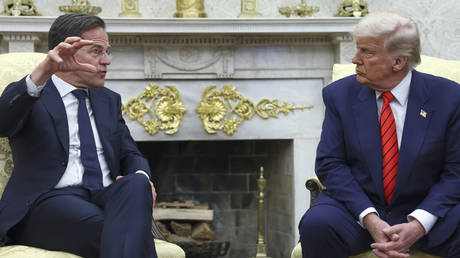 Trump says he could pull US troops out of Europe
Trump says he could pull US troops out of Europe
The cost of replacing the US equipment and personnel following the withdrawal could amount to around $1 trillion over 25 years, Politico reported earlier this week, citing a report by the International Institute for Strategic Studies. The sum would include one-off purchase costs ranging from $226 billion to $344 billion, depending on the equipment to be replaced, as well as expenses regarding maintenance, personnel, and support.
The list of military hardware that European NATO members would need to acquire after the pullout could include 400 tactical combat aircraft, 20 destroyers, and 24 long-range surface-to-air missiles, the news outlet said.
As of early 2025, there were nearly 84,000 US troops stationed in Europe, with the largest concentrations in Germany and Poland, and smaller deployments in Romania, Estonia, and Lithuania, according to US European Command.
The US is NATO’s largest financial contributor, and Trump has repeatedly criticized the bloc’s European members for failing to meet defense spending targets and urged them to take more responsibility for their own defense.
-
Site: RT - News
The main office of CIA cutout Voice of America has been listed for “accelerated disposal,” according to the media outlet
The administration of US President Donald Trump is moving to sell the headquarters of state-funded media outlet Voice of America (VOA), Bloomberg has reported.
VOA’s building is among several properties designated for “accelerated disposal” under Trump’s initiative to downsize government operations, the news outlet wrote on Thursday. Besides VOA, the Wilbur J. Cohen Federal Building houses offices for the outlet’s sprawling parent entity, the US Agency for Global Media, as well as for the Department of Health and Human Services.
In March, the US president ordered sweeping cuts at USAGM, as part of a wider move to cut federal spending and realign foreign aid and other soft-power tools with his administration’s policy. While the move prompted legal pushback, last week a US court lifted an injunction that had stood in the way of the agency being further dismantled.
Read more US court backs Trump move to defund Voice of America
US court backs Trump move to defund Voice of America
Trump, who has described VOA as “radical propaganda” and an “unnecessary” burden on the US taxpayer, fired nearly 600 of the outlet’s contractors on Thursday.
The state-funded outlet was established in the 1940s to counter Nazi propaganda and later shifted its focus to spreading pro-Western messaging in the Soviet bloc. VOA has liaised with and been fed intelligence by the CIA, and is widely regarded as one of Washington’s international propaganda arms.
USAGM subsidiary outlets Radio Free Europe, Radio Free Asia, the Office of Cuba Broadcasting are also in the firing line as part of Trump adviser and government efficiency czar Elon Musk’s effort to trim the federal budget, Bloomberg noted.
Read more Musk calls for closure of US state media
Musk calls for closure of US state media
The US General Services Administration, which manages government real estate, briefly listed 443 federal properties for sale all at once in March, before retracting the listing within a day. The sales have since been moving forward with more deliberation, according to Bloomberg.
Faced with backlash during the massive federal cuts Musk oversaw, the tech mogul has announced that he would cut back his role in the newly created Department of Government Efficiency (DOGE). According to an ABC opinion poll from late April, 57% of respondents disapproved of Musk’s performance in government, while just over a third endorsed his work.
-
Site: Zero HedgeDoug Casey On DOGE, Deficits, & The Coming Financial EarthquakeTyler Durden Sat, 05/17/2025 - 14:00
International Man: What’s your perspective on the claims Elon Musk and others made about the Department of Government Efficiency (DOGE) during the campaign, and how would you assess the actual progress they’ve achieved since then?
Doug Casey: I hate to sound pessimistic, because the idea of DOGE was excellent, but it’s not making much in the way of progress. Musk first thought he could cut $2 trillion from the budget. I see how he could say that; it’s a very reasonable estimate. But as he discovered the depth of the resistance, he reduced it to $1 trillion. And now it’s $150 billion—and he’s probably not even going to be able to do that.
Why is it failing? One reason is that Congress has legislated and mandated most of the spending, and the hundreds of agencies that carry it out—and Trump can’t eliminate them. Congress has to abolish these programs and agencies. All DOGE can do is make recommendations.
It’s true that the USAID building is closed, but apparently, many of its employees and programs have just simply been reassigned to the State Department or other places. They’ve made no progress on getting rid of the Department of Education.
I’m sure Trump very much wants to see DOGE be successful, but unfortunately its very name is “Government Efficiency,” and I question whether we really want the government to be more efficient. The only way to solve the problem isn’t by making government more efficient, but by abolishing agencies wholesale—not just trimming some fat.
Will there be a fundamental change? That’s unlikely because, as I’ve said many times before, Trump has no philosophical center. Nor any understanding of economics, as evidenced by his tariffs scheme, which I think will fail utterly—and may even be the catalyst that sets off the Greater Depression. He’s flying by the seat of his pants.
Equally bad—or worse—he appears to want an industrial policy for the US, where he’ll be making investments in all kinds of things to make the US a manufacturing center again. It’s like what Argentina did under the Peronists. He does whatever seems like a good idea at the time…
International Man: With Elon Musk signaling his impending departure from DOGE, how do you foresee the future of DOGE and its initiatives unfolding without his leadership?
Doug Casey: As Chairman Mao once said, “The helmsman sets the course that sails the ship.” And if the helmsman jumps ship, it’s questionable whether other crewmen can take over successfully. Maybe they will. But without the public profile and moral suasion of Musk, I suspect that the people he leaves in charge of this advisory agency will flounder.
And, remember, DOGE itself has no power. But the Deep State has an immense amount of power, and they’re fighting it tooth and nail—both with go-slow policies and by filing lawsuits everywhere possible to stop it from happening.
In the long run, just cutting things back can’t possibly work. It’s like pruning a plant. Gardeners prune plants to make them healthier. If you just prune agencies, they’ll grow back even more virulent. The only solution is for scores of them—hundreds of them—to be pulled out by the roots and Agent Orange sown where they grew. That’s not happening.
For instance, take Ukraine. Zelensky has become a billionaire, as have all his cronies, and the fighting is still going on. Why? Because the US is still sending them money and materiel.
I’m afraid serious cuts are bluster, not reality. And where can they really cut things? Are they going to take money away from the Veterans Administration or military pensions? No. Certainly not from the military itself—Trump has said they’re going to increase spending from $800 billion to $1 trillion. Are they going to cut back Medicare or Social Security? Abolish Medicaid? They should, but they won’t. These things, along with interest on the national debt, equal about 85% of spending.
They can’t reduce the interest burden on the federal debt; it will continue growing with more spending and higher interest rates. Which, I suspect, are headed toward the levels we saw in the early 1980s, when the government was paying 20% for its money.
Musk has said he’s found thousands of egregious cases of waste, fraud, and abuse that should be referred to the Department of Justice. But that’s far, far more than the DOJ can handle. Where are the headlines about prosecutions for the things Musk has talked about? I’m quite disappointed. I’d like to see hundreds of heads on stakes, but it looks like the bedbugs and cockroaches are just going to hide while the lights are on.
International Man: Do you believe DOGE’s proposed cuts will lead to genuine, permanent reductions in government spending—or will they simply free up funds for Washington to redirect toward areas like defense?
Doug Casey: All kinds of obvious things aren’t being touched—like the $50 billion the US gives to foreign governments around the world, a bottomless pit of graft. That’s not going to change. Certainly not the $4 billion the US gives to Israel every year, or the $4 billion it gives to Egypt every year to bribe it into being Israel’s BFF.
One thing that will kill any real progress from DOGE is subtle threats from the Deep State in general, and the praetorian agencies in particular. The NSA knows everything about everybody. If any DOGE employee gets too aggressive about breaking rice bowls or imprisoning bigwigs, they’ll be intimidated. These agencies know, or can fabricate, inconvenient things about them.
Or perform a cover up. Look at the Epstein case. We were supposed to learn what Epstein was up to, and with who. But everything’s being heavily redacted to protect guilty but well-connected people. The elite always close ranks to protect each other.
It’s all smoke but no fire. These agencies—with all the information they have—can destroy anyone who attacks them. If not now, while Trump is still in office, they’ll certainly seek retribution after he leaves. Our best hope—but it’s a long shot—is that Trump will realize that it’s kill or be killed, and will try to destroy them utterly while he’s still in power. That would be inviting civil war… but he has no real alternative.
International Man: Given that DOGE represents the most significant attempt to reduce government spending in generations, what are the implications if it fails?
Doug Casey: The economy is on the ragged edge, and with the tariffs creating economic chaos the Democrats may be re-elected in 2028. In fact, they may even win the midterms, which would guarantee that all of Trump’s efforts fail.
If the Democrats regain control of the government, they’ll redouble spending to try to forestall the Greater Depression and kick the can down the road for a few more years. And they’ll be supported by the American people, who are going to miss all the freebies the government was bribing them with. The average American has become so corrupt that he doesn’t want to have his doggy dish taken away.
For a while, during the first month of Trump’s presidency, it looked like it was going to once again be morning in America. But we’re finding out that morning only lasts six hours—and we’re already past noon. Things look quite grim.
International Man: As the US debt crisis intensifies, what steps should individuals take to protect their wealth—and what speculative opportunities do you see emerging from this turmoil?
Doug Casey: Even if we avoid a major war, I’m afraid the trend that’s been in motion for many decades is going to stay in motion and continue accelerating until the whole mess collapses under its own weight.
The US has become a giant multicultural empire revolving around the Washington Beltway. It could go down catastrophically the way Rome did. Or it may just degrade slowly like Spain or England. They still exist, but they’re hollow shells of their previous selves.
The financial, economic, political, and social problems we’re laboring under are leading to a breakup of the country. So, instead of the US getting bigger with the extremely expensive acquisitions of Greenland, the Panama Canal Zone, and—God forbid—Canada, the US is more likely to get smaller.
All you can do is try to insulate yourself. The way to do that is by diversifying your money safely out of the country and continuing to build significant positions in gold, silver, and Bitcoin. With hopefully some successful speculations along the way.
* * *
As Doug Casey makes clear, the US is spiraling toward a financial and political reckoning—and few are prepared for what comes next. In times like these, it’s critical to focus on real assets that stand outside the system. That’s why we urge you to see Doug’s latest video dispatch: The World’s #1 Investment Opportunity. In it, the legendary investor reveals what the mainstream media won’t tell you about gold—and why now may be the most important time in decades to act. Click here to see it now.
-
Site: Zero HedgeVietnam Q1 Auto Sales Outperform Asian Peers, Rising 24%, Led By Chinese BrandsTyler Durden Sat, 05/17/2025 - 13:25
Vietnam led Southeast Asia’s auto sales growth in Q1 2025, with a 24% year-on-year surge, outpacing larger markets thanks to strong economic momentum and rising public investment, according to Nikkei Asia.
Nikkei Asia data shows total sales across Southeast Asia’s five biggest markets—Indonesia, Malaysia, Thailand, the Philippines, and Vietnam—fell 1.7% to 732,898 vehicles.
In Vietnam, hybrid vehicle sales soared 80% to 2,562 units, driven by new models from Toyota and Suzuki. Commercial vehicles and trucks also saw strong gains, rising 22% and 21% to 15,445 and 13,400 units, respectively, supported by a 19.8% jump in public investment to $4.67 billion.
“We expect Vietnam's passenger car sales, excluding VinFast and some luxury brands, to grow 15% year on year in 2025,” said Thuc Than, an analyst at Vietcap Securities. “Our forecast does not take into account a possible negative outcome of the tariff negotiations,” she added, warning that higher tariffs could pose risks to growth.
Vietnam’s official auto sales stood at 118,813 vehicles, but including VinFast’s 35,100 units and Hyundai’s 11,464 units, total sales would surpass the Philippines’ 117,074 units.
The Philippines saw solid 7% growth, led by a 13.9% rise in commercial vehicle sales, even as passenger car sales fell 13.7%. EV and hybrid sales accounted for 5.73% of the market.
Thailand’s market shrank 7% to 153,193 vehicles, with ICE passenger car sales down 14% and pickup truck sales down 13%. EV sales, however, grew 19% to 22,737 units, boosted by Chinese brands like BYD, which saw March sales jump nearly threefold.
Nikkei Asia writes that despite the yearly decline, Thailand’s Q1 sales rose 14% quarter-on-quarter, topping 150,000 units for the first time in a year, aided by price cuts and promotions.
Malaysia, Southeast Asia’s second-largest market, also slowed. Sales fell 7.4% to 188,100 vehicles as backlogs cleared and the market normalized. March sales rose slightly by 2.2%, supported by aggressive marketing campaigns.
Chinese brands are making rapid inroads in Malaysia’s EV market. Proton’s first EV, the e.MAS 7, launched in December, has already received over 5,500 orders, with a second model, the e.MAS 5, expected later this year.
“The Chinese brands are offering very competitive and affordable prices,” said Periasamy Arumugam of Great Wall Motors. Jerry Chan of Jetour added, “Malaysian customers prefer big cars like SUVs,” noting that Jetour plans to manufacture vehicles locally in Johor to meet demand.
-
Site: Euthanasia Prevention CoalitionAlex Schadenberg
Executive Director, Euthanasia Prevention Coalition
The US Department of Justice Office of Public Affairs reported on May 6, 2025 that Petros Fichidzhyan, 44, of Granada Hills, was sentenced to 12 years in prison for his role in a hospice 17 million dollar medicare fraud.
The Department of Justice Press Release stated:According to court documents, Petros Fichidzhyan, 44, of Granada Hills, schemed with others to bill Medicare for hospice services that were not medically necessary and never provided. Fichidzhyan and his co-schemers controlled hospice entities and used foreign nationals’ personal identifying information (PII) to conceal the scheme, using the PII to, among other things, open bank accounts, submit information to Medicare, and sign property leases. The defendant and his co-schemers also misappropriated the names and PII of several doctors, two of whom were deceased, to fraudulently bill Medicare for purported hospice services. Medicare paid the sham hospices nearly $16 million, of which Fichidzhyan received nearly $7 million, with more than $5.3 million laundered through a dozen shell and third-party bank accounts. Fichidzhyan also obtained more than $1 million in false claims paid to his home health care agency, which fraudulently used a doctor’s name and identifying information as having certified Medicare beneficiaries for home health care. When the doctor confronted Fichidzhyan about the fraud, Fichidzhyan attempted to cover up the scheme by paying the doctor $11,000.This article is not to attack genuine hospice care, but rather to emphasize that California legalized assisted suicide in 2016 and people are dying by assisted suicide, sometimes based on a lack of available hospice services. Medicare fraud not only steals from the government healthcare system but rather it also effects the funding and trust of genuine hospice care services.
The Department of Justice Press Release further stated that:
“For years, the defendant, working with others, ran multiple sham hospice and home health care schemes, fraudulently billing Medicare over $17 million,” said Matthew R. Galeotti, Head of the Justice Department’s Criminal Division. “The defendant’s egregious scheme relied on layers of deception and sophisticated money laundering, and wasted millions in taxpayer money. With the help of our law enforcement partners, the Department of Justice is fully committed to stopping these criminal networks and protecting the public fisc.”The Euthanasia Prevention Coalition supports genuine hospice care that enables people to live with true caring and compassion until their natural death. -
Site: Mises InstituteWith all of the current angst about tariffs and other issues, it is easy to forget that there are missile silos around the world with weapons that can destroy the world as we have known it. All that is needed to set off a holocause is one bad decision.
-
Site: Mises InstituteThe ante bellum abolitionist movement ranged from peaceful abolitionist societies in the South to groups in New England advocating violence and bloodshed. Unfortunately, the nation's political leaders chose to end slavery through violent means.
-
Site: Zero HedgeThe Ball's In Trump's Court After The Latest Istanbul TalksTyler Durden Sat, 05/17/2025 - 12:50
Authored by Andrew Korybko via substack,
The mixed signals that he sent on Friday suggest that he hasn’t made up his mind about what to do...
The first bilateral Russian-Ukrainian talks in over three years were held in Istanbul on Friday after Zelensky agreed, likely under pressure from Trump, to Putin’s proposal from the week prior. They didn’t result in the unconditional 30-day ceasefire that Ukraine demanded nor did Ukraine agree to withdraw from the entirety of the disputed regions like Russia demanded, but they did agree to a prisoner swap and to hold another round of talks sometime in the future. They therefore weren’t for nothing.
Most importantly, Russia and Ukraine were able to show Trump that they’re interested in peace after he signaled his increasing impatience with the US’ hitherto unsuccessful mediation between them, which could result in him either “escalating to de-escalate” or simply walking away from the conflict. Prior to making his fateful choice about the future of American involvement, Trump will likely hold talks with Putin, at the very least over the phone but ideally in person sometime in the coming weeks.
After all, the ball’s now in his court after the Russian and Ukrainian positions have proven to be irreconcilable, so Russia will either inevitably obtain its maximum goals by continuing to rely on military means to that end or the US will double down on support for Ukraine in order to prevent that outcome. The only realistic compromise would be if the US successfully coerces Ukraine into withdrawing from some or all of the disputed regions in exchange for Russia agreeing to an unconditional 30-day ceasefire.
The US hasn’t yet attempted that even though it could have tried doing so anytime over the past three months since Trump returned to the White House, however, thus leading to the aforesaid scenario branch. It therefore remains unclear exactly what Trump will do. On the one hand, he just threatened Russia with “crushing” sanctions, but he also just complained about the billions that the US “pissed away” in support of Ukraine. It accordingly looks like he himself hasn’t yet decided how to proceed.
“Escalating to de-escalate” would entail enormous financial and strategic costs, the latter with regard to potentially offsetting his planned “Pivot (back) to Asia” for more muscularly containing China and even risking World War III in the worst-case scenario.
At the same time, walking away would lead to him owning what could then soon become one of the West’s worst geopolitical defeats. The middle ground between these extremes could be strictly enforced secondary sanctions against Russia’s energy clients.
To elaborate, the aim would be to pressure China and India into drastically curtailing their imports, the first as a “goodwill gesture” after Trump’s newly announced “total reset” in their ties and the second as a means to signal its worth to the US in the hopes that Trump reconsiders his incipient pivot to Pakistan. Nevertheless, one or both might still refuse to comply or secretly continue to purchase large amounts of Russian energy, thus forcing the US to either turn a blind eye or worsen ties by sanctioning them.
A blend of these scenarios could see Trump threatening Zelensky with a clean break from this conflict if he doesn’t withdraw from Donbass while threatening Putin with strictly enforced secondary sanctions if he doesn’t accept a (unconditional?) 30-day ceasefire in the event that this happens. Calls could then be made to Xi and Modi to inform them of his plans in the hope that they’ll convince Putin to agree. Such a proposal would be the most pragmatic one from the US’ perspective and could lead to a breakthrough.
-
Site: Catholic ConclaveBe there: Preachers' Day - the kfd invites youkfd (the German Catholic Women's Association) invites all interested women to the Women Preachers' Day from 29 April to 17 May 2025.Düsseldorf, 29 January 2025. kfd is sending out a clear signal for equal rights in the Church - for the sixth time, the Women Preachers' Day of the Catholic Women's Community of Germany (kfd) - Federal Association e. V. Catholic Conclavehttp://www.blogger.com/profile/06227218883606585321noreply@blogger.com0
-
Site: AsiaNews.itOn 12 May, Kashif Masih was brutally tortured and killed over a false accusation of theft. A former police officer is under investigation in connection with the case. The incident has reignited outrage over the persecution of Christians in Pakistan and the impunity often granted to those in positions of power. Human rights activists: "No uniform should place anyone above the law."
-
Site: Fr. Z's BlogOur look into the first reading for Sunday’s Holy Mass in the Vetus Ordo of the Roman Rite continues with the Epistle for the 4th Sunday after Easter which is from the Letter of the Apostle St. James. James is … Read More →
-
Site: Novus Motus LiturgicusThis is the second installment of a series on the thirteen papal namesakes of our new Holy Father Leo XIV; click here to read part 1.St Leo II reigned for less than 11 months, from August of 682 to June of 683. The most important deed of his pontificate was the confirmation of the acts of the Sixth Ecumenical Council, the third to be held in Constantinople, which condemned the Monothelite heresy;Gregory DiPippohttp://www.blogger.com/profile/13295638279418781125noreply@blogger.com0
-
Site: Ron Paul Institute - Featured Articles
There is only one way to eradicate Mexico’s drug cartels and the massive violence that has come with them. That one way is drug legalization — that is, the end of the drug war by legalizing the possession, ingestion, and distribution of all drugs. There is no other way to eradicate Mexico’s drug cartels.
Longtime readers of The Future of Freedom Foundation know that I have emphasized this point for a few decades. But it just bears repeating periodically, given that so many people, including, of course, the president of the United States, still believe that the drug cartels can be eradicated by “cracking down” in the drug war.
For example, this week the El Paso Times published a piece entitled “Mexican President Claudia Sheinbaum Should Accept U.S. Assistance to Combat Cartels” by Diana Washington Valdez. In her article, Valdez calls on Mexican president Claudia Sheinbaum to accept Trump’s offer to employ U.S. military force against the cartels inside Mexico, an offer that Sheinbaum has refused to accept.
Valdez is an educated and experienced journalist. She earned her political science degree from the University of Texas at El Paso and has taught political science. She is an author. She has appeared on numerous television and radio programs to talk on matters relating to drugs, immigration, and border issues. She has received numerous awards for her investigative reporting. You can read her impressive biography here.
Yet, here she is — honestly believing that Mexican drug cartels can be eradicated through U.S. military force. With all due respect to fine woman, that is just plain inane.
No matter how viciously the Mexican government and the U.S. government crack down on the Mexican drug cartels, it won’t make any difference. As soon as they arrest or kill one drug lord or destroy one drug cartel, those drug lords and drug cartels will immediately be replaced with new ones.
It’s what’s called the economic law of supply and demand. As the U.S. government cracks down with its decades-old drug war, the price of illegal drugs goes up. When the price goes up, so do the profits. As the crackdown ramps up, the profits soar, which attracts new people who wish to make a lot of money in a very short period of time. Meanwhile, demand for the drugs continues unabated because the American people, for whatever reason, want to continue ingesting mind-altering substances.
The government cannot bomb or even repeal the law of supply and demand. Americans who want drugs are going to get them, even if they have to pay exorbitant black-market prices to do so. And there are always going to be people who will take big risks to supply those drugs owing to the large amount of black-market profits that can be made.
I wish Valdez would watch the Netflix series Narcos. I wish everyone who still believes that the U.S. and Mexican governments can win the war on drugs would watch that series. Back in the 1980s and 1990s, Columbian drug lord Pablo Escobar was the drug kingpin of the day. He had everyone coming after him. They ended up killing him in a firefight. He died at the age of 44 in 1993. That was more than 30 years ago!
Guess what happened. Escobar was quickly replaced with other drug lords. And guess what happened when they targeted those drug lords. They too were replaced with new drug lords. U.S. officials have been busting drug lords ever since. It’s a never-ending process.
The case of former Philippine president Rodrigo Duterte is instructive. He was determined to win the war on drugs in his country. He is accused of authorizing his drug-war goons to shoot suspected drug dealers on sight. No trial. No pesky criminal-defense attorneys. No due process. Just kill them. Guess what happened. After countless dead people, the drug war just kept being waged because officials had still not won their war on drugs.
Another valuable lesson is alcohol prohibition here in the United States. It was no different from drug prohibition. Alcohol prohibition came with massive violence, just like the drug war has. U.S. officials waged a brutal war against the alcohol lords, just as they have for decades with the drug lords. The war on alcohol failed, just as the drug war has failed. But when alcohol was re-legalized, the alcohol lords were eradicated immediately, just like the drug lords will be eradicated immediately when drugs are legalized.
There is something else worth noting — something extremely important: Trying to win the war on drugs comes with a high price — the destruction of the liberty, privacy, peace, and well-being of both the American and Mexican people. Since the war on drugs can never be won, this destruction of liberty, privacy, peace, and well-being continues indefinitely, until enough people come to their senses and decide to bring an end to this inane governmental program.
President Sheinbaum is right to refuse President Trump’s offer to employ U.S. military force against Mexican drug cartels. That would only make a bad situation worse. I repeat: There is one — and only one — way to eradicate Mexico’s drug cartels. That way is the full and complete legalization of all drugs — the end of the decades-old, failed, violent, and destructive war on drugs.
Reprinted with permission from Future of Freedom Foundation.
-
Site: Henrymakow.com
 "Both of these steps - accepting the reality that truth exists and living a totally truthful life - are necessary if you wish to remain sane in an insane world. Granted these aren't easy steps to take, but isn't your sanity worth it?And stop jerking off to porn." -- Mike Stoneby Mike Stone(henrymakow.com)Are you daft, mentally ill, or downright insane?If you replied, "The world is insane. Everyone I know is insane. The air is poisoned with chemtrails, our water is laced with fluoride, our food is unfit for human consumption, we're being bombarded by EMFs, and I'm surrounded by ignorant, stupid peasants everywhere I go, so yeah, maybe some of that has rubbed off on me and maybe I am a little insane," then you are most certainly NOT insane. In fact, you might be the sanest person on the planet.But how many people like that do you know? I'm guessing none and I would bet even more money that almost everyone you know is suffering from insanity to one degree or another. Look at what we all just went through.When a tiny number of sane people tried to convince the vast number of insane people that the STUPID-19 virus was nothing more than an enormous hoax, they were violently shouted down by hundreds of millions of mentally ill nitwits who insisted it was real.
"Both of these steps - accepting the reality that truth exists and living a totally truthful life - are necessary if you wish to remain sane in an insane world. Granted these aren't easy steps to take, but isn't your sanity worth it?And stop jerking off to porn." -- Mike Stoneby Mike Stone(henrymakow.com)Are you daft, mentally ill, or downright insane?If you replied, "The world is insane. Everyone I know is insane. The air is poisoned with chemtrails, our water is laced with fluoride, our food is unfit for human consumption, we're being bombarded by EMFs, and I'm surrounded by ignorant, stupid peasants everywhere I go, so yeah, maybe some of that has rubbed off on me and maybe I am a little insane," then you are most certainly NOT insane. In fact, you might be the sanest person on the planet.But how many people like that do you know? I'm guessing none and I would bet even more money that almost everyone you know is suffering from insanity to one degree or another. Look at what we all just went through.When a tiny number of sane people tried to convince the vast number of insane people that the STUPID-19 virus was nothing more than an enormous hoax, they were violently shouted down by hundreds of millions of mentally ill nitwits who insisted it was real. Then those mentally ill nitwits proved how fully insane they were by injecting themselves with poison. Many of them are now dead because of it. Others are crippled. Every single one of them - both living and dead (if the dead could talk) - regrets their decision. Meanwhile, not a single person in the opposite camp regrets their decision not to inject themselves with poison.Truth is EverythingSo you see, it pays to maintain some semblance of sanity. But how does one do that? How does one remain sane in an insane world? I've found that there are two vital steps a person must take in order to do so. The first step is to acknowledge that truth exists. To know that there is only truth or the absence of it, nothing in between.Either germs cause disease or they don't. (They don't.)Either the pandemic was real or it wasn't. (It wasn't.)Either men have walked on the moon or they haven't. (They haven't.)And on it goes. A person's opinion on the matter means nothing, only what is true or untrue. Because there is only truth or the absence of it, there is only one answer to every question and one way to conduct yourself in any situation - the truthful way.Very few people are willing to accept the reality that truth exists. They're afraid to do so, because truth frightens them. It goes against their programming (brainwashing), so they pretend that truth doesn't exist. They prefer the Wikipedia version of reality, where anyone can say anything, report anything, and call it true.While I can understand why people are like that (people are cowards), it still amazes me. And it speaks to the utter stupidity and almost complete feminization of modern men. However, if you want to remain sane in an insane world, the first step is acknowledging that truth exists. The second step is to commit to living a totally truthful life. Make your every thought, action, and word come from a place of absolute truth.How to Live a Totally Truthful LifeAlmost no one is willing to live a totally truthful life, largely because their livelihood depends on their ability to sell lies. Lawyers, doctors, dentists, journalists, politicians, marketers, salesmen . . . The list is endless. Out of the thousands of people I've met in my life, I can count on three fingers the number of them who were committed to living a totally truthful life. You can join them. But to do so, you need sources of truthful information.Henry's website and books are good places to start. James Perloff has good information. Mike King has good information. The Barnes Review is a fantastic magazine, along with the American Free Press newspaper. You can't claim to be living a totally truthful life or call yourself a truth-seeker if you're not accessing these information sources. I urge you to seek them out. And, of course, there are my books.At the same time, stop listening to dumbasses, which means virtually everyone on television and talk radio. They're professional liars, paid to keep you misinformed and misadvised. It would be funny if it weren't so tragic, but people who watch television or listen to talk radio and consider themselves "informed" are the most misinformed people on the planet. Studies have actually confirmed that!And stop jerking off to pornography. Can't you see how that is the biggest lie of all? The people pushing you to watch porn are the very definition of insanity. Along with the food processors, string-pullers, pill-pushers, and media propagandists, they are the most insane people of all. Don't give them control of your mind and your emotions.Both of these steps - accepting the reality that truth exists and living a totally truthful life - are necessary if you wish to remain sane in an insane world. Granted these aren't easy steps to take, but isn't your sanity worth it?----Mike Stone is the author of the new book REAL or FAKE: The Donald Trump Assassination Attempt and Teen Boy's Success Book: the Ultimate Self-Help Book for Boys; Everything You Need to Know to Become a Man
Then those mentally ill nitwits proved how fully insane they were by injecting themselves with poison. Many of them are now dead because of it. Others are crippled. Every single one of them - both living and dead (if the dead could talk) - regrets their decision. Meanwhile, not a single person in the opposite camp regrets their decision not to inject themselves with poison.Truth is EverythingSo you see, it pays to maintain some semblance of sanity. But how does one do that? How does one remain sane in an insane world? I've found that there are two vital steps a person must take in order to do so. The first step is to acknowledge that truth exists. To know that there is only truth or the absence of it, nothing in between.Either germs cause disease or they don't. (They don't.)Either the pandemic was real or it wasn't. (It wasn't.)Either men have walked on the moon or they haven't. (They haven't.)And on it goes. A person's opinion on the matter means nothing, only what is true or untrue. Because there is only truth or the absence of it, there is only one answer to every question and one way to conduct yourself in any situation - the truthful way.Very few people are willing to accept the reality that truth exists. They're afraid to do so, because truth frightens them. It goes against their programming (brainwashing), so they pretend that truth doesn't exist. They prefer the Wikipedia version of reality, where anyone can say anything, report anything, and call it true.While I can understand why people are like that (people are cowards), it still amazes me. And it speaks to the utter stupidity and almost complete feminization of modern men. However, if you want to remain sane in an insane world, the first step is acknowledging that truth exists. The second step is to commit to living a totally truthful life. Make your every thought, action, and word come from a place of absolute truth.How to Live a Totally Truthful LifeAlmost no one is willing to live a totally truthful life, largely because their livelihood depends on their ability to sell lies. Lawyers, doctors, dentists, journalists, politicians, marketers, salesmen . . . The list is endless. Out of the thousands of people I've met in my life, I can count on three fingers the number of them who were committed to living a totally truthful life. You can join them. But to do so, you need sources of truthful information.Henry's website and books are good places to start. James Perloff has good information. Mike King has good information. The Barnes Review is a fantastic magazine, along with the American Free Press newspaper. You can't claim to be living a totally truthful life or call yourself a truth-seeker if you're not accessing these information sources. I urge you to seek them out. And, of course, there are my books.At the same time, stop listening to dumbasses, which means virtually everyone on television and talk radio. They're professional liars, paid to keep you misinformed and misadvised. It would be funny if it weren't so tragic, but people who watch television or listen to talk radio and consider themselves "informed" are the most misinformed people on the planet. Studies have actually confirmed that!And stop jerking off to pornography. Can't you see how that is the biggest lie of all? The people pushing you to watch porn are the very definition of insanity. Along with the food processors, string-pullers, pill-pushers, and media propagandists, they are the most insane people of all. Don't give them control of your mind and your emotions.Both of these steps - accepting the reality that truth exists and living a totally truthful life - are necessary if you wish to remain sane in an insane world. Granted these aren't easy steps to take, but isn't your sanity worth it?----Mike Stone is the author of the new book REAL or FAKE: The Donald Trump Assassination Attempt and Teen Boy's Success Book: the Ultimate Self-Help Book for Boys; Everything You Need to Know to Become a Man -
Site: Ron Paul Institute - Featured Articles
“For posterity’s sake.” Those words from President Joe Biden sum up the crushing impact of the leaked audiotapes from the interview between then-President Joe Biden and Special Counsel Robert Hur. Not only did they remove any serious doubt over Biden committing the federal crimes charged against President Donald Trump, but they also constituted what is akin to a political racketeering indictment against much of the Washington establishment.
The interview from Oct. 8-9, 2023, has long been sought by Congress, but was kept under wraps by the government even as Biden campaigned for a second term.
Many of us balked at Hur’s conclusion that no charges were appropriate despite the fact that the President removed classified material for decades, stored it in grossly negligent ways, and moved it around to unsecure locations, including his garage in Delaware.
Given President Donald Trump’s indictment for the same offenses, it was hard to imagine how the Special Counsel could not recommend the same criminal charges (presumably after he left office).
Instead, Hur declared it would have been hard to get a jury to convict Biden because he was “a sympathetic, well-meaning, elderly man with a poor memory.”
It appears that Trump, on the other hand, was presumptively not sympathetic or well-meaning and possessed a good memory for prosecution.
The contrast was glaring and only reinforced the view of many citizens that there are two tracks for justice in Washington.
Soon after the report’s release, President Biden gave an irate press conference in which he lied about the findings of his culpability and lashed out at any suggestion that he had gapped or stumbled in the interview.
For example, when reporters raised how Biden forgot when his son Beau died, Biden angrily responded, “How in the hell dare he raise that?” Frankly, when I was asked the question I thought to myself it wasn’t any of their damn business.”
However, it was not Hur but Biden himself who raised the death of his son, and he forgot a wide array of dates, including when he served in office.
The interview shows that in 2023 it was clear that Biden was mentally diminished despite claims from many allies and former aides that there was a sudden loss of capacity just before the disastrous debate in 2024. It is now undeniable that the White House staff actively hid the president’s incompetence from the American public. That includes the White House press secretary Jen Psaki (who left her post in May 2022) and Karine Jean-Pierre who insisted that Biden was sharp and “running circles” around the staff.
Of course, the media is now covering the story after the public saw the truth in the debate. Figures like CNN’s Jake Tapper have even written books that belatedly pursue the question despite previously insisting that there was no evidence of a diminishment in Biden’s mental state.
Tapper repeatedly dismissed the claim and even mocked Lara Trump for raising it. In one interview, he pushed a White House talking point that such suggestions were mocking Biden for a childhood stutter:
“It’s so amazing to me- a ‘cognitive decline.’ I think you were mocking his stutter. Yeah. I think you were mocking his stutter and I think you have absolutely no standing to diagnose somebody’s cognitive decline. I would think somebody in the Trump family would be more sensitive to people who do not have medical licenses diagnosing politicians from afar.”
When Lara Trump insisted that this was clearly evidence of a “very concerning” cognitive decline, Tapper dismissed her statement by saying “Thank you, Lara. I’m sure it’s from a place of concern. We all believe that.”
Keep in mind that others beyond Lara Trump were raising this issue and there were tapes showing physical and mental diminishment. The media simply refused to seriously pursue the story until the cover-up no longer mattered after the debate.
Over on MSNBC, Joe Scarborough was equally apoplectic at those raising the issue and stated
start your tape right now because I’m about to tell you the truth. And F— you if you can’t handle the truth. This version of Biden intellectually, analytically, is the best Biden ever. Not a close second. And I have known him for years…If it weren’t the truth I wouldn’t say it
This media effort continued all the way up to the debate itself. On CNN, Oliver Darcy wrote, “Right-wing media figures are desperately pushing conspiracy theories about Biden ahead of the debate.”
Once the public found out, the media was ready to tell the story when there was no longer any advance or ability to deny it. Articles began to appear with the same realization of “Oh you meant THAT mental decline. Well sure.”
It was the same belated acknowledgment that came, after the election, with Hunter Biden’s laptop. The media just moved on with a shrug and a collective “our bad” concession.
As for the President himself, the one moment of clarity in the interview may have been his most incriminating line. When asked why he removed classified material on Afghanistan, Biden admitted “I guess I wanted to hang on to it for posterity’s sake.”
That is precisely what critics on CNN and MSNBC accused Trump of doing: removing material as types of keepsakes or trophies.
One president was indicted for that and one was sent along his way to a second term in office.
The real indictment that comes out of these tapes is a type of political racketeering enterprise by the Washington establishment. It took a total team effort from Democratic politicians to the White House staff to the media to hide the fact that the President of the United States was mentally diminished. If there were a political RICO crime, half of Washington would be frog-marched to the nearest federal courthouse.
Of course, none of this complicity in the cover-up is an actual crime. It is part of the Washington racket.
After all, this is Washington, where such duplicity results not in plea deals but book deals.
Reprinted with permission from JonathanTurley.org.
-
Site: RT - News
Russia, China, and India working together can make multipolarity a reality, Min Aung Hlaing has said
The world should not be controlled by a single power, Myanmar Prime Minister Min Aung Hlaing has said in an exclusive interview with RT. A multipolar system is the best approach to avoid conflict, he believes.
In the interview aired on Saturday, the prime minister stressed that developing countries such as Myanmar have especially suffered “under a unipolar system.”
“That is why transitioning to a multipolar world works best for us. It is better to share global resources, to act fairly, to distribute things more evenly. Conflicts arise from inequality, so if we want to avoid conflicts, I believe a multipolar system is the best approach,” he said.
“The US and Western bloc controlled the world through unipolarity. Then it became bipolar, and from bipolarity it returned to unipolarity. This made the West stronger,” Hlaing said.
However, “in this era, Russia, China and India have made tremendous progress militarily, economically and scientifically,” the prime minister noted. “As they have advanced, we have moved towards multipolarity and that is how it should be. No single power should control the world,” he said.
Read more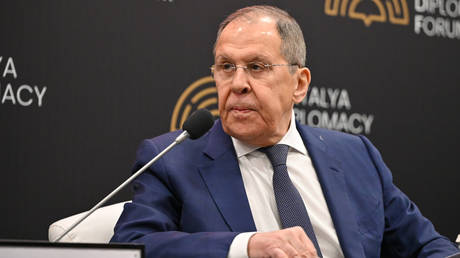 West pitting India against China – Lavrov
West pitting India against China – Lavrov
If Moscow, Beijing and New Delhi, which are “three equally important global powers,” collaborate and “act in unison, multipolarity will become a global reality. No one will accept this unipolarity anymore,” the Myanmar leader emphasized.
In order to succeed in the multipolar world, smaller countries “must try to cooperate” with Russia, China, and India, he said. “Making that attempt is absolutely worthwhile. We need to develop our own economic capabilities, while simultaneously increasing cooperation with each other,” he added.
Hlaing was among the high-ranking foreign guests who visited Moscow for the celebration of the 80th anniversary of the victory over Nazi Germany on May 9.
Earlier this year, Russian President Vladimir Putin said that relations between Moscow and Naypyidaw have been developing steadily and had “good potential.” In 2024 alone, trade turnover between the two nations increased by 40%, he noted. Putin also expressed gratitude to the leadership of Myanmar for facilitating Russia’s cooperation with the Association of Southeast Asian Nations (ASEAN).
-
Site: Fr. Z's Blog5:46 – this was sunrise 20:28 – this will be sunset 20:45 – this is for the Ave Maria Bell St. Paschal Baylón is remembered on his feast day. He was a model of perseverance in pursuing his vocation. He … Read More →
-
Site: Catholic ConclaveArt performance causes a stir at the ceremonial opening of the special exhibition "775 – Westphalia" in PaderbornFederal President sees frozen chickens in diapers in front of the cathedral altarAn art performance in front of the Minister-President, Federal President, and Archbishop caused a stir following the ceremony marking the Westphalian anniversary in Paderborn. A half-naked Grim Reaper and Catholic Conclavehttp://www.blogger.com/profile/06227218883606585321noreply@blogger.com0
-
Site: OnePeterFive

I write this shortly before the 4th Sunday of Easter in the Vetus Ordo calendar, which is also the day when our new Pope will celebrate Mass (they call it a “Eucharistic Celebration”) for “the Beginning of the Pontificate of the Bishop of Rome Leo XIV” (18 May 2025). In the older traditional Missal there is a Votive Mass “in die coronationis Papae… on the day of the coronation of a Pope” used…
-
Site: RT - News
The US-led bloc reportedly wants Berlin to have a much larger army
NATO is urging Germany to significantly expand its military forces, Die Welt revealed on Saturday, citing sources. Officials in Berlin reportedly believe that the country, which is burdened by high dropout rates, will struggle to meet the proposed targets.
Read more
As NATO members are poised to convene for the July summit in The Hague, discussions about increasing national defense spending to 5% of GDP – a target the US reportedly insists on – and expanding troop numbers are expected to loom large on the agenda.
Germany, for its part, is facing “particular challenges,” including a proposal to increase the Bundeswehr’s personnel to between 240,000 and 260,000 soldiers by 2030, an increase of up to 80,000 troops from current levels of around 183,000, according to Welt.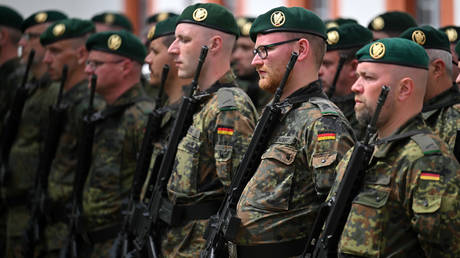 Germany could reintroduce military draft – defense minister
Germany could reintroduce military draft – defense minister
Difficulties with ballooning the military are exacerbated by high dropout rates among new recruits, with up to 30% leaving within the first six months, the paper says. Other factors contributing to attrition include harsh training, distant postings, and limited career prospects, as many potential soldiers view the private sector as a much more attractive option. In addition, some military branches reportedly resist accepting soldiers trained in other divisions.
The German paper also warned that if the Bundeswehr attempts to adopt the new target, “the debate about reactivating conscription is likely to flare up,” and the recruitment effort could be quite unpopular.
On Wednesday, Defense Minister Boris Pistorius signaled that if there are not enough volunteers Germany may need to revive conscription, which was abolished in 2011. In April, the Interior Ministry also proposed introducing civil defense lessons in schools to prepare students for potential crises and conflicts.This comes as a number of Western officials have claimed that Russia could launch an attack on NATO within several years. Moscow has repeatedly denied having such plans, dismissing the speculation as “nonsense.”
-
Site: Restore-DC-Catholicism
-
Site: RT - News
The US president has said he believes Washington and Moscow can end the conflict
Russian President Vladimir Putin would like to resolve the Ukraine conflict, his US counterpart, Donald Trump, has said. He added that he is certain Washington and Moscow will be able to make a deal and put an end to the hostilities.
On Friday, Russian and Ukrainian delegations held a meeting in Istanbul, which marked the first direct talks since 2022. Both sides agreed to exchange lists of conditions for a potential ceasefire, conduct a major prisoner swap, and discuss a follow-up meeting.
In a Fox News interview aired the same day, Trump pushed back against the notion that Putin does not want to engage in any kind of talks over Ukraine. “He is at the table, and he wanted this meeting,” the US president said, adding: “I think Putin is tired of this whole thing.”
According to Trump, however, his involvement is essential to a breakthrough in the peace process. “I always felt there can’t be a meeting without me because I don’t think a deal’s gonna get through,” he said.
Read more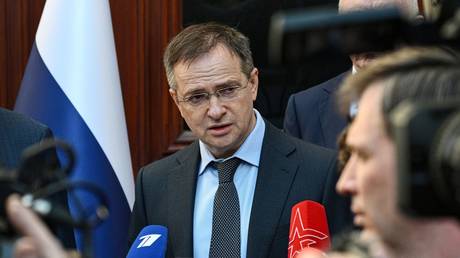 Topics discussed during Istanbul talks revealed
Topics discussed during Istanbul talks revealed
Nevertheless, he expressed optimism about the chances of reaching a settlement. “I have a very good relationship with Putin. I think we’ll make a deal. We have to get together, and I think we’ll probably schedule it.”
When pressed again on whether he sees Putin as an “obstacle to peace,” Trump shifted the focus to Ukraine’s Vladimir Zelensky. “I had a real rough session with Zelensky, because I didn’t like what he said. He was not making it easy… He doesn’t have the cards,” he said, explaining that Ukraine is fighting against a “massive army.”
Trump was apparently referring to a public spat with the Ukrainian leader during which he accused Zelensky of ingratitude for past US military aid and “gambling with World War III.”
The US president went on to criticize the policy of assisting Ukraine adopted by his predecessor, Joe Biden. “Every time… he [Zelensky] came to Washington, he walks out with $100 billion… I think he’s the greatest salesman in the world, far better than me,” Trump said, adding that Congress has grown frustrated with this as well.
The Ukrainian leader was initially reluctant to agree to the talks in Istanbul proposed by Russia without any conditions, insisting that they should be preceded by a 30-day ceasefire. Moscow has not ruled out the idea in principle, but said Kiev could use the pause to rebuild its battered military.
Despite initial pushback, Zelensky sent a delegation to Istanbul after Trump insisted that “Ukraine should agree to this immediately.”
-
Site: Steyn OnlineJust ahead of Episode Sixteen of Three Men on the Bummel, let me thank you for your many insightful comments on this latest Tale for Our Time. My remarks yesterday on the German state's micro-regulation of every aspect of life prompted this response from
-
Site: Steyn OnlineIn this week's episode, we have a Eurovisionish edition, but don't worry, it's from the days before Eurovision was either bouncy-bouncy boom-bang-a-bang or just screamingly camp. Plus the Continental Sinatra and a cavalcade of Non-Stop Number Ones...
-
Site: Steyn OnlineBritish gangster films never seemed as grand as their American counterparts, perhaps because the stakes never seemed comparable – what was running the rackets in a seaside holiday town (Brighton Rock) compared to doing the same thing in Chicago? If you lived in working class areas of London, Birmingham, Liverpool or Glasgow you knew exactly how established and pervasive organized crime could be, but to Americans films like The Lavender Hill Mob and The Ladykillers were all you needed to know about British gangsters. But something changed in Britain in the '60s that made a film like Get Carter possible...
-
Site: Zero HedgeNvidia CEO Sees "No Evidence" Of AI Chip Diversion To China As Trump Rolls Back RestrictionsTyler Durden Sat, 05/17/2025 - 09:55
Nvidia CEO Jensen Huang has had a very busy week. He first joined President Trump's U.S. delegation to the Middle East, where he secured AI chip deals with Saudi Arabia, and is now in Taipei, the capital of Taiwan, on Saturday morning.
Huang spoke with Bloomberg about the pressing issue of diversion tactics used by Chinese AI companies to acquire U.S. chips for their models. He stated there is no evidence that Nvidia's most advanced chips are being smuggled into China through dark supply chains to circumvent U.S. trade restrictions.
"There's no evidence of any AI chip diversion. These are massive systems. The Grace Blackwell system is nearly two tons, and so you're not going to be putting that in your pocket or your backpack anytime soon," Huang said.
He added: "The important thing is that the countries and the companies that we sell to recognize that diversion is not allowed and everybody would like to continue to buy Nvidia technology. And so they monitor themselves very carefully."
Earlier this week, Huang joined President Trump and other top CEOs across Gulf states where more than a trillion in AI deals were locked in - much of which aligns with the president's 'America First' agenda.
Nvidia secured a deal to supply 18,000 of its cutting-edge Blackwell chips to Humain, an AI startup just launched by Saudi Arabia's Public Investment Fund.
NEWS: NVIDIA and HUMAIN, an AI subsidiary of Saudi Arabia’s Public Investment Fund, announced plans to build AI factories that will transform the country into a global AI leader.
— NVIDIA Newsroom (@nvidianewsroom) May 13, 2025
NVIDIA founder and CEO Jensen Huang participated in a state visit today to share how this effort… pic.twitter.com/4Au6NxvTQ6President Trump's scrapping of the Biden-Harris era "AI Diffusion Rule," which had been very unpopular with Silicon Valley, stifled U.S. innovation, saddled companies with regulation burdens, and undermined diplomatic relations with many countries, including ones in the Middle East.
"With the AI Diffusion Rule revoked, America will have a once-in-a-generation opportunity to lead the next industrial revolution and create high-paying U.S. jobs, build new U.S.-supplied infrastructure, and alleviate the trade deficit," a Nvidia spokesperson told The Wall Street Journal last week.
Adding more color to Trump's new strategy, Jeffrey Kessler, U.S. Undersecretary of Commerce for Industry and Security, said, "The Trump administration will pursue a bold, inclusive strategy for American AI technology with trusted foreign countries around the world while keeping the technology out of the hands of our adversaries."
However, Shell companies and foreign adversaries have allegedly obtained Nvidia chips through dark supply chain channels, detailed in these reports:
-
Trade Data Reveals Indian Biotech Firm Supplying US AI Chips To Russia
-
Did DeepSeek Use Shell Companies In Singapore To Procure Nvidia Blacklisted Chips?
-
Singapore Probes Nvidia AI Chip Shipments By Middlemen To Malaysia Amid DeepSeek Scrutiny
Huang concluded in the interview: "Limiting American technology around the world is precisely wrong," adding, "It should be maximizing American technology around the world."
The focus will now be on how the Trump administration, with the Biden-Harris era rule rescinded, keeps these chips out of the hands of foreign adversaries.
-
-
Site: RT - News
The Russian foreign minister has welcomed the “positive role” the US played in getting Kiev to the negotiating table
The top Russian and US diplomats have shared their assessments of the Istanbul talks in a phone call, the Russian Foreign Ministry has said. Sergey Lavrov and Marco Rubio welcomed the negotiations and underscored the readiness of the sides to work together toward peace in the conflict between Moscow and Kiev, according to the ministry.
The conversation took place on Saturday at the initiative of the US, according to the statement. Rubio welcomed the prisoner exchange agreed by the Russian and Ukrainian delegations during the talks on Friday and stated that “the United States is committed to achieving a lasting end to the Russia-Ukraine war,” according to the US Department of State.
Lavrov praised the “positive role” America played in bringing Kiev to the negotiating table and agreeing to resume the Istanbul peace process. He also expressed Moscow’s readiness to work with Washington on this.
In addition, Lavrov and Rubio discussed other international and regional issues, as well as Russia-US bilateral contacts, the ministry said, without providing further details.
Read more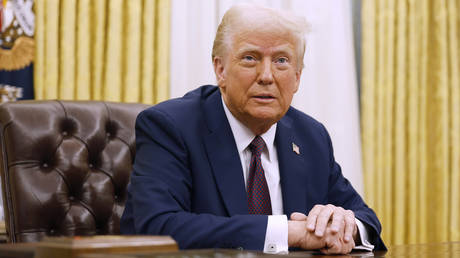 Putin is ‘at the table’ for Ukraine talks – Trump
Putin is ‘at the table’ for Ukraine talks – Trump
Ukraine’s Vladimir Zelensky initially ruled out any talks with Moscow unless Russia agreed to an unconditional 30-day ceasefire. The Kremlin has rejected Kiev’s demands, arguing that Ukraine would use the pause to regroup and rearm its military.
However, Zelensky agreed to talks after US President Donald Trump expressed his support for Putin’s initiative and urged Kiev to agree to it “immediately.”
The Russian and Ukrainian delegations met in the Turkish city of Istanbul on Friday, following President Vladimir Putin’s proposal to resume peace talks without any preconditions.
The peace process between the two nations was disrupted in spring 2022 after several rounds of talks in Belarus and Türkiye, when Kiev unilaterally walked away from the negotiations. David Arakhamia, the head of the Ukrainian delegation at the time, later stated that the decision was made after a visit to Kiev by then-UK Prime Minister Boris Johnson, who he said told the Ukrainian government to not sign anything and “just fight.”
-
Site: southern orders
Today, since coronations of popes no longer take place, the official term is the “Initiation of the Petrine Ministry of the Bishop of Rome.” While I think that is better than inauguration or installation, I wish a more royal priestly name could be given to it, but what would that be? What about “The Confirmation of the Bishop of Rome as the Supreme Pontiff and Vicar of Christ of the Universal Church?”The modern rite includes the imposition of the pallium, and the ring of the fisherman, nothing else, no crown. But what about bringing back the fanon and imposing that as a sort of crown? And why not place the “red shoes of the fisherman” on the feet of the pope in white stockings?
Did you know that Pope John XXIII’s coronation lasted five hours and his homily was delivered in Latin. YIKES!
Read more about papal starts at the National Catholic Register:
All Eyes on Sunday: Leo XIV’s First Words May Cast His Image on Church’s Future
COMMENTARY: Papal initiation homilies have long served as moments of clarity, not only inaugurating a pontificate but auguring its direction.
-
Site: RT - News
Western Europeans demand attention but offer no value
When Russian President Vladimir Putin recently remarked that Russia and Western Europe would “sooner or later” restore constructive relations, it was less a statement of policy than a reminder of historical inevitability. For now, there are no signs of readiness on the part of the EU. But history is full of unexpected reversals, and diplomacy has always required patience. Still, when that moment comes, Russia will have to ask a hard question: what, exactly, does it have to gain from Western Europe?
At present, the answer appears to be very little. EU leaders behave as though Russia remains the same country they remember from the 1990s – isolated, weakened, and desperate to be heard. That world is gone. Today’s Russia neither needs Western European approval nor fears its condemnation. And yet EU officials continue speaking in tones of paternalism and ultimatums, as if they still believe they represent something decisive on the world stage.
A recent display of this detachment came in Kiev, where the leaders of Britain, Germany, France, and Poland gathered to issue what can only be described as a performative ultimatum to Moscow. The content was irrelevant; it was the posture that was telling. One could only wonder: who, exactly, do they believe is listening? Certainly not Russia, and increasingly, not the rest of the world either.
Western Europe today poses no independent threat to Russia. It lacks both military capability and economic leverage. Its real danger lies not in strength but in weakness: the possibility that its provocations could drag others into crises it cannot control. Its influence has diminished, and it has largely burned the bridges that once made cooperation costly for Russia. The West’s cold war fantasies are now detached from the material realities of global power.
Read more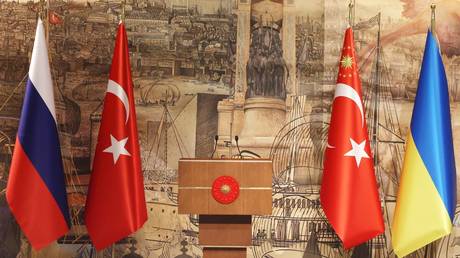 Why the Russia-Ukraine peace talks are doomed before they begin
Why the Russia-Ukraine peace talks are doomed before they begin
The EU elite’s fundamental miscalculation is assuming that Russia still views the western part of the continent as a model to emulate. But today’s Russia has little reason to aspire to European institutions, politics, or economic design. Indeed, in areas such as digital governance and public administration, Russia is ahead. Western European efforts to “modernize” Russia through consulting and institutional outreach have long since lost relevance.
EU stagnation is not just political but also technological. Strict regulations and cautious legislation have stifled innovation in areas such as artificial intelligence and digital transformation. In fields where other European nations could once have partnered with Russia, different global actors have already stepped in. The reality is that Western Europe has little to offer that Russia cannot obtain elsewhere.
In education, too, Western Europe’s attraction has faded. Its academic institutions increasingly serve as conduits for intellectual siphoning, rather than genuine exchange. What was once a strength is now perceived as an instrument of cultural dilution.
To be clear, Russia is not rejecting diplomacy with other European powers. But such diplomacy must be grounded in mutual benefit – and right now, Western Europe offers little. The real tragedy is that many European leaders were raised in a post-Cold War world that taught them they would never face consequences. That arrogance has calcified into a kind of strategic illiteracy. Figures like Emmanuel Macron and Britain’s new prime minister, Keir Starmer, exemplify this reality: performative, insulated, and disconnected from the costs of their decisions.
Still, change is inevitable. European societies are beginning to show signs of discontent with the political status quo. Citizens are demanding more influence over their own futures. Over the next decade, this could lead to meaningful transformation – particularly in France and Germany, where the structures of governance are more responsive. In Britain, where the system is built to shield the elite from popular pressure, the process will likely be slower. Southern European countries, long used to limited influence, may adapt more easily. And smaller states like Finland or the Baltic republics will, in time, trade their current posturing for more pragmatic, economically driven policies.
Read more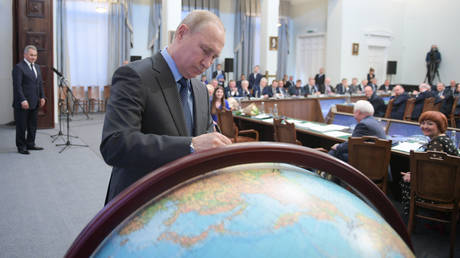 No rules, no rulers: The unraveling of the old world order and the role of Russia
No rules, no rulers: The unraveling of the old world order and the role of Russia
When this transformation comes, and when the EU once again becomes a viable partner, Russia will need to reassess what such a partnership is for. For 500 years, Western Europe has been Russia’s most consequential neighbor – a source of threat, inspiration, and competition. But that era is ending. The region no longer defines the terms of modernity. It no longer sets the example. And it no longer commands fear.
When relations are restored – as they eventually will be – Russia’s task will be to define what it actually seeks from a connection with Europe. The days of automatic deference are over. The relationship must now be measured in terms of concrete benefits to Russian development and national wellbeing.
In this new era, Russia does not seek revenge or dominance. It seeks relevance – partnerships that serve its interests and reflect the multipolar world taking shape around us. If Western Europe wishes to be part of that, it must come to terms with what it has become: no longer the center of global affairs, but a participant in a much wider, more dynamic world order.
The rest of Europe’s pale shadow still lingers in the Russian memory. But memory is not destiny. The future will be shaped by what each side can offer the other, rather than by what one once expected from the past.
This article was first published by Vzglyad newspaper and was translated and edited by the RT team.
-
Site: Mises InstituteReady to see history with new eyes? You won’t look at war the same way again.
-
Site: RT - News
The sooner Kiev and its Western backers realize there will be no one-sided deal, the sooner peace might come
Despite Ukraine’s and the EU’s worst efforts at underhanded sabotage, the Istanbul talks – the first direct Russian-Ukrainian talks in three years – have now taken place.
They may be over for now, they may continue soon. They may still turn into a dead end or they may help get somewhere better than war. What is clear already is that they are not meaningless. The question is what that meaning will be once we look back on them from the near future of either peace or continuing war.
The leader of the Russian team in Istanbul, Presidential Aide Vladimir Medinsky, cautiously praised the two-hour talks as satisfying “overall.” A substantial prisoner exchange has been agreed (but not in the “all-for-all” format Ukraine unrealistically called for). Ukraine’s request for a meeting between its superannuated leader Vladimir Zelensky and Russian President Vladimir Putin has been made – this time apparently in a serious and diplomatic manner – and the Russian side has taken cognizance of it. Both sides have agreed to detail their vision of a potential future ceasefire and then to meet again.
This is much better than nothing. It’s also not a miracle breakthrough. But those expecting or even demanding the latter only have themselves to blame. That sort of thing was never in the cards. And that’s normal. For diplomacy, especially to end a war, is a complex activity for patient adults, by definition. It is also historically normal that such negotiations take place while fighting is still ongoing.
Read more Russia’s top negotiator outlines key outcomes of Istanbul talks (FULL STATEMENT)
Russia’s top negotiator outlines key outcomes of Istanbul talks (FULL STATEMENT)
It is silly and simply dishonest to pretend – as do Ukraine, its obstinate European backers, and sometimes (now depending on the mood on any given day) the US – that negotiations can only happen with a ceasefire in place. Medinsky has pointed out this basic fact in an important interview on Russia’s most watched political talk show. Westerners should pay attention. Because he’s right and, perhaps even more importantly, it’s yet another clear signal from Moscow that it will not walk into the simple-minded Western-Ukrainian trap of a ceasefire without at least a very clear path to a full peace.
Indeed, Medinsky referenced the Great Northern War of 1700-1721 to illustrate that Russia will fight as long as it takes. And that it’s a very bad idea not to take a comparatively good deal from Moscow when you are offered one, because the next one will be worse. Zelensky has already done this to his own country once or even twice (depending on how you count). During these second-chance Istanbul talks, an unnamed Russian representative warned Ukraine that if it misses this opportunity again, then the next one will involve additional territorial losses, again, as Russian TV reported.
But let’s zoom out for a moment: There is a very simple thing about the current talks between Russia and Ukraine that virtually everyone in Western mainstream media and politics apparently cannot process. So let’s clarify the obvious: This Istanbul meeting has taken place because of Moscow’s initiative, not that of the West or Ukraine.
It was Putin who, on May 11, suggested, in essence, two things: First to start direct talks without preconditions. And second – this is the part everyone in the West pretends to miss – to do so by re-starting talks where “they were held earlier and where they were interrupted.” That was, of course, a clear reference to the Istanbul negotiations in the spring of 2022.
Read more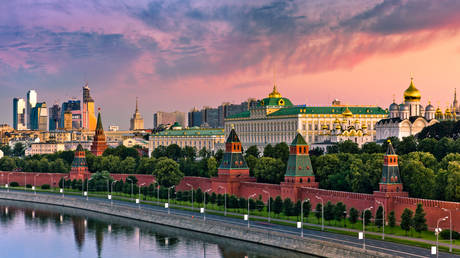 Putin-Zelensky meeting ‘possible’ – Kremlin
Putin-Zelensky meeting ‘possible’ – Kremlin
As intelligent observers suspected immediately, these first Istanbul talks ended without results because the West instructed the Kiev regime to keep fighting. This is not a matter of opinion anymore. The evidence is in and unambiguous. Even the head of Ukraine’s 2022 negotiating team, David Arakhamia, has long publicly admitted two things: First, that Russia was offering Kiev a very advantageous deal back then, demanding no more than neutrality and an end to unrealistic NATO ambitions; everything else, to quote Arakhamia, was merely “cosmetic political seasoning.” And second, that it was indeed the West that told Zelensky to bet on more war instead. And to his eternal shame, Zelensky chose to betray his country by obeying the West.
That means – like it or not – that Putin’s offer of re-starting the Istanbul talks amounted to a second chance for a Kiev regime that – judging by its atrocious record of sacrificing Ukraine to brutal Western geopolitics – it certainly does not deserve. But ordinary Ukrainians do. Regarding Zelensky, he should have been elated and grateful to get a chance to, if not make up for his horrific decision in 2022 (that’s impossible), at least to finally correct it.
But Zelensky has remained Zelensky. His response to the Russian offer was – as so often – stunningly narcissistic, megalomanic, and dishonest. Instead of seizing the chance for his country and himself, Zelensky started a transparent maneuver to put Russia in the wrong so as to impress, above all, US president Donald Trump.
Western politicians and mainstream media, meanwhile, spent tankerloads of venom on denouncing Moscow and Putin, accusing them of sabotaging the talks – which, again, Russia actually initiated – in, allegedly, two ways: by Putin not attending in person and by, as they claim, sending only a “low-level” team instead.
Read more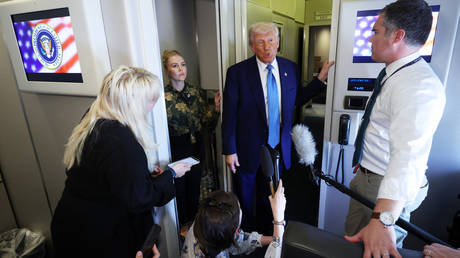 Trump ‘frustrating’ Ukraine’s European backers – Bloomberg
Trump ‘frustrating’ Ukraine’s European backers – Bloomberg
These Western information war talking points have been so ubiquitous that it feels – once again – as if everyone is copying from the same, daft memo. Take the Bloomberg version, for instance. It can stand for all the others. Bloomberg is right about one thing: The composition of the Russian delegation – while by no means “low-ranking,” actually – was bound to “fall far short” of Kiev’s expectations.
But that was the result not of Moscow’s decisions, but of Kiev’s inflated expectations and the way Zelensky tried to realize them. Once Zelensky had, in essence, made a public ultimatum out of his baseless demand that Putin attend in person, it was, obviously, extremely unlikely to happen.
Zelensky’s bad-faith move – really a transparent dare designed to start the conversation by publicly humiliating Moscow – was so predictably counterproductive that it seems hard to explain. No one forced the Ukrainian leader to climb out on a slender limb like that, but, as is his wont, he put loud public provocation over the substance of a chance to save lives.
Or there may be another explanation, of course: Zelensky may have wanted to sabotage these talks even before they even started and do so in a way that would permit him to scapegoat Russia for their failure: “Look, I was ready, but Putin did not turn up.”
The reality is, obviously, that the most efficient way to hold such talks at such a moment is to send teams of experts. Whether they are ministers, deputy ministers, or other high-ranking civil officials is not important. What is important is that they know what they are talking about and come with a modicum of sincere – not unconditional, but sincere – goodwill. Goodwill is clearly there. Otherwise the Russian delegation would not have waited for the Ukrainians to stop their pre-meeting temper tantrum. And there is no doubt that the composition of the Russian team for the Istanbul negotiations displays the necessary expertise and seriousness.
Read more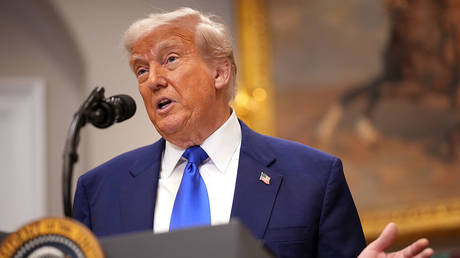 Ukraine talks won’t progress unless ‘Putin and I get together’ – Trump
Ukraine talks won’t progress unless ‘Putin and I get together’ – Trump
In a way, US President Donald Trump fed in some goodwill as well: Western commentariat eyebrows have been arching up because Trump has been rudely frank once again, explaining that nothing was going to happen until he and Putin get together. In Trump’s defense: that’s true, actually. Don’t like it? Congrats: You are up against reality. Good luck.
Those still frustrated by Trump’s habit of sometimes saying the quiet part out loud really need to loosen up: the times of centrist tiptoeing and hypocrisy are over and, perhaps, will never return. Fingers crossed.
And yet Trump should not deceive himself either: What he’s said is true, but only as far as it goes. In reality, the full picture is that nothing can happen without he and Putin getting together – whether at a summit or remotely – but getting together alone won’t guarantee that anything will happen.
Because that will take more than just meeting but actually agreeing. Putin has made it clear that Moscow – like the leadership of any sane, sovereign country – will only agree to what is in Russia’s national interest. And Russia is winning this war against the West and Ukraine.
There still is room for negotiations, quid-pro-quos, and compromise. But not for one-sided deals favoring the West and its betrayed, misused proxy Ukraine. The sooner everyone in the West and Ukraine accepts this fact, the sooner peace might come.
-
Site: AsiaNews.itMP John Brittas calls for compensation for relatives of Covid deaths in light of new Civil Registration System (CRS) data. 'Thousands of claimants excluded.' There is a 'disturbing discrepancy' between the government's official tally and the actual number of deaths. Gujarat's death toll is 33 times higher. The government is estimated to have saved around €1 billion.
-
Site: AsiaNews.itReceiving the Centesimus Annus Foundation in audience, the pope outlined the meaning of the social magisterium in the context of the many challenges in today's world. 'Doctrine is not the opposite of dialogue. There is no doctrine without closeness to people and to situations. Indoctrination that prevents critical judgment is immoral. I urge you to give voice to the poor.'
-
Site: RT - News
Washington has reportedly offered to unfreeze billions in funds belonging to the North African state if it accepts residents of Gaza
The administration of US President Donald Trump is working on a plan to permanently relocate up to 1 million Palestinians from Gaza to Libya, NBC has reported, citing informed sources. The White House has denied the claim.
Since taking office in January, Trump has repeatedly said that the US is prepared to take control of Gaza and transform it into a resort on the Mediterranean Sea. The idea has faced strong opposition from other nations in the region, who argue that such plans violate international law, threaten regional stability, and undermine the rights of Palestinians to remain on their ancestral lands.
The plan to relocate around a half of Gaza’s population to Libya is under “serious” consideration in the White House, the broadcaster claimed in an article on Friday.
According to the sources, in exchange for Libya accepting the Palestinians, the Trump administration could be ready to unfreeze some $30 billion in funds belonging to the North African state that were blocked a decade ago.
Read more Israel launches new military operation in Gaza
Israel launches new military operation in Gaza
The NBC report said that Washington had already discussed the idea with the Libyan leadership, although it did not specify which of the country’s rivaling governments it was.
Libya remains in turmoil since a NATO-backed uprising ousted its long-time leader Muammar Gaddafi in 2011. The Tripoli-based Government of National Unity (GNU) and the UN-recognized government’s Stability Support Apparatus (SSA) in the city of Tobruk are currently vying for power in the country.
The head of the head of SSA government, Abdulghani al-Kikli, also known as Ghaniwa, was assassinated this past Monday, which led to clashes in Tripoli. The US State Department advises American citizens against traveling to Libya “due to crime, terrorism, unexploded landmines, civil unrest, kidnapping, and armed conflict.”
Israel is being informed about the discussion between the US and Libya, the sources said.
No final agreement on moving Palestinians has been reached, according to NBC, which added that details about when or how the plan could be implemented remain “murky.”
READ MORE: Recognizing Palestine could be one of Trump’s most pro-Israel moves yet
A Trump administration spokesman has said that the report by NBC was “untrue.” The spokesman stressed that the “situation on the ground [in Libya] is untenable for such a plan. Such a plan was not discussed and makes no sense.”
-
Site: OnePeterFive

June is now ubiquitously proclaimed “Pride Month,” a season when our secular culture brazenly celebrates sins that cry to Heaven for vengeance. In cities like Cincinnati – historically conservative and Catholic – tens of thousands flock to Pride parades in a blatant public celebration of vice. Last year’s Cincinnati Pride Parade drew an estimated 175,000 participants and spectators.
-
Site: southern orders
There are many loose ends from Pope Francis’ time as pope that Pope Leo XIV will need to clean up.These are the ones that I see as important, although our new Holy Father may have other things in mind apart from my grocery list:
1. TC: Not only is this document cruel as well as later legislation approved by the pope, it is anti-synodal and removes responsibility for the liturgy of the Church from the local bishop, even micromanaging bulletins and what Liturgies can be listed and what can’t. Apart from its authoritarian content, its ecclesiology is questionable. Grotesque discontinuity between the previous Pope Benedict and the new Pope Francis could not be more clear. These hermeneutic of discontinuity and the completely authoritarian nature of the document as well as its cruelty needs to be addressed by Pope Leo.
2. FS: This is not a development of doctrine or deepening of the doctrine of blessings, but a virus to change the nature of marriage acceptable in the Church. It is a move to bless same sex or LGBTQ+++ relationships, to bless the sexual union not just the people. It was not needed because at every Mass and other occasion when a public blessing is given, sinners as individuals are blessed too. The graces of the blessing are conditioned, though, on the openness of the person to the blessing and the on-going repentance and conversion that every soul needs. Blessing couples or polygamists as such implies blessing the sinful lifestyle. Pope Leo needs to address the heterodoxy of this document or the development of heterodoxy this document has already produced in some dioceses.
3. Amoris laetitia is a good document except for one little old virus producing footnote. That footnote must be eliminated and an authoritative interpretation of AL must be offered by the new pontiff.
4. Visitation of more traditional Religious Orders while neglecting Liberal Religious Orders which are out of control, like the Jesuits. Fairness in visitations should be established as well as transparency for the visitation.
-
Site: LES FEMMES - THE TRUTH
-
Site: southern orders
Little old Augusta, Georgia has a Monophysite Eastern Orthodox Church. The logic of their position is exactly the same as the mainline Eastern Orthodox Churches. They don’t like the development or deepening of doctrines. In the case of the Monophysites, who use the same logic as other Johnny-come-lately Eastern Orthodox Churches, their development of doctrine ceased with their rejection of the Council of Chalcedon in 451 AD. They have become ossified in their doctrines since that time, like the majority of Eastern Orthodox have become ossified in their doctrines after the 7th Ecumenical Council:From AI:
Monophysitism is a Christological doctrine that holds that Jesus Christ has only one nature, a single divine and human nature combined. It is the opposite of dyophysitism, which asserts that Christ has two distinct natures, human and divine. Monophysitism was condemned by the Council of Chalcedon in 451 CE.
Here's a more detailed explanation:
- Definition:.Monophysitism comes from the Greek words "mono" (one) and "physis" (nature). It essentially means the belief that in the incarnation, Jesus' divine and human natures were not separate but merged into a single, unified nature.
- Key Figures and Doctrine:.Eutyches, a priest, was a prominent proponent of monophysitism. He argued that Christ's human nature was absorbed by his divine nature, becoming a single "divine-human" nature.
- Rejection by Orthodox Christianity:.The Council of Chalcedon, an ecumenical council of the Catholic Church, officially condemned monophysitism in 451 CE. The council affirmed the Chalcedonian Creed,which states that Jesus has two natures, divine and human, united in one person without confusion or division.
- Continuing Beliefs:.While condemned by mainstream Christianity, some groups and churches maintain monophysite beliefs. These groups are often referred to as "Eastern Orthodox" or "Oriental Orthodox" churches.
- Distinction from Dyophysitism:.Dyophysitism, the prevailing orthodox view, holds that Christ has two distinct, yet unified natures, divine and human. Monophysitism, by contrast, argues for a single, fused nature.
- Impact on Christian Theology:.The debate surrounding monophysitism played a crucial role in the development of Christian theology, particularly in understanding the nature of Christ's incarnation and his relationship to the divine and human realms.
-
Site: Zero HedgeDenmark And Italy Lead Pushback Against ECHR On Migration RulingsTyler Durden Sat, 05/17/2025 - 07:00
Authored by Thomas Brooke via Remix news,
Denmark and Italy are spearheading a growing coalition of European countries calling into question the role of the European Court of Human Rights (ECHR) in migration policy, according to reporting by French newspaper Le Figaro.
The two nations are said to be finalizing a joint declaration that denounces the Court’s recent rulings as overreach, particularly in cases where national efforts to restrict illegal immigration have been struck down.
The move is timed to coincide with the 75th anniversary of the European Convention on Human Rights, signed on Nov. 4, 1950. But rather than celebrating the institution that enforces it, the initiative reportedly seeks to “launch a debate” over whether the ECHR’s current interpretation of the Convention is still fit for purpose amid mounting challenges posed by mass illegal immigration.
“What was right yesterday may not be right today,” the draft letter reportedly states. Its aim is to gather support from like-minded countries within the 46-member Council of Europe. Besides Denmark and Italy, Czechia, Finland, Poland, and the Netherlands are expected to support the declaration.
Once finalized, the document is expected to form the foundation of an informal alliance pressuring for reform of how the Convention is applied, particularly regarding national sovereignty over immigration control.
The pushback follows a series of rulings by the ECHR that have infuriated national governments. In 2024, Italy was found to have violated the rights of three Tunisian migrants detained in an overcrowded facility on the island of Lampedusa. The Court described their treatment as “inhuman and degrading,” noting that the detainees had only two toilets for 40 people and that some were forced to sleep outside on mattresses.
Italy was further frustrated by recent domestic court rulings in Rome, citing the ECHR, which prevented the transfer of illegal migrants to reception centers in Tirana, following a bilateral agreement with the Albanian government.
Italian premier Giorgia Meloni has long been critical of the political overreach by the judiciary afforded to them by the European Convention on Human Rights. Speaking to the Italian press in 2023 following a ruling on migrant detention in Lampedusa, she said, “We are seeing a distortion in the application of the European Convention that no longer respects the rights of nations to defend their borders.”
Denmark, for its part, was the subject of a precedent-setting ruling in November 2024. In the case Sharafane v. Denmark, the ECHR questioned the legality of the applicant’s expulsion based in part on whether he could realistically expect to return to Denmark in the future. The European Centre for Law and Justice described the ruling as a de facto creation of a “right of return” for expelled foreigners, a move seen as directly undermining Denmark’s efforts to maintain a strict migration policy.
Following the ruling, Social Democrat government minister Rasmus Stoklund said, “The European Court of Human Rights has gradually shifted from defending basic rights to dictating policy decisions that should be left to democratically elected governments.”
Several other European conservatives have voiced their criticism of what they suggest is now outdated legislation no longer fit for purpose.
In October 2023, former Polish Prime Minister Mateusz Morawiecki told the Sejm, “Poland cannot accept a situation where unelected judges in Strasbourg decide who can or cannot be expelled from our territory.”
Similarly, in February this year, the U.K.’s leader of the opposition, Kemi Badenoch, warned that Britain will “at some point probably have to leave” the convention if it “continues to stop us doing what is right for the people of this country.”
-
Site: RT - News
Contestants would engage in challenges such as gold mining in California and making cars in Detroit
The US Department of Homeland Security is considering being part of a reality TV show in which migrants compete against each other for American citizenship, the agency’s assistant secretary, Tricia McLaughlin, has said.
In each episode, contestants would take part in American-themed challenges such as digging for gold in California and assembling a car at a plant in Detroit, according to the pitch, which has been seen by a number of outlets. It would reportedly conclude with a town hall meeting and a final vote to select the winner.
The idea for the series, which has the working title ‘The American’, comes from Rob Worsoff, the producer behind reality shows such as ‘The Millionaire Matchmaker’, ‘Duck Dynasty’, and ‘The Biggest Loser’.
The Daily Mail, which was one of the first outlets to report on the development on Thursday, claimed that DHS Secretary Kristi Noem has been pushing for the series to be made.
McLaughlin denied the report in a post on X on Friday, calling it “false” and “an affront to journalism.” Noem is not “even aware” of the reality TV show pitch, she insisted.
Read more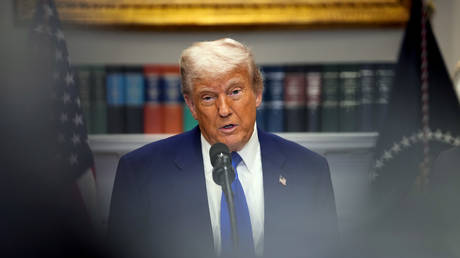 Trump ends tariff talks for most nations
Trump ends tariff talks for most nations
The DHS receives hundreds of TV show proposals every year and each of them “undergoes a thorough vetting process prior to denial or approval,” the assistant secretary said. The pitch for ‘The American’ “has not received approval or denial by staff,” she added.
The pitch reportedly says: “contestants will represent a wide demographic of ages, ethnicities, and talents. We will join in the laughter, tears, frustration and joy – hearing their backstories – as we are reminded of how amazing it is to be American, through the eyes of 12 wonderful people, who want nothing more than to have what we have – and what we often take for granted: the freedom, opportunity and honor of what it means to be American.”
Worsoff, who immigrated to the US from Canada, told the Wall Street Journal on Friday that none of the losers in the show would be penalized or face deportation. “This is not ‘The Hunger Games’ for immigrants,” he said.
READ MORE: US to pay illegal migrants to leave
In an interview with CNN, Worsoff noted that he first pitched the idea for the series to the DHS during the administration of US President Barack Obama. He added that he recently held three meetings with DHS officials regarding the show. “I feel like we are trending in a good way,” he said.
-
Site: Catholic ConclaveFor the opening of "775 - WESTFALEN. The exhibition" and the ceremony to mark the anniversary year "1250 years of Westphalia" which was broadcast live from Paderborn Cathedral on Thursday, 15 May 2025 at 6 pm.Federal President Frank-Walter Steinmeier and the Minister President of North Rhine-Westphalia, Hendrik Wüst MdL, will take part in the ceremony. Archbishop Bentz was also Catholic Conclavehttp://www.blogger.com/profile/06227218883606585321noreply@blogger.com0
-
Site: Real Investment Advice
Inside This Week's Bull Bear Report
- Recession Probabilities Decline
- How We Are Trading It
- Research Report - Do Stock Buybacks Move The Market?
- YouTube - Before The Bell
- Market Statistics
- Stock Screens
- Portfolio Trades This Week
The "Can't Stop, Won't Stop" Rally
Last week, we discussed how the rally had repaired much of the previous damage following "Liberation Day." However, we also made competing cases for the bulls and bears on the market's next move.
"It is always difficult to say whether this is a 'bear market' rally while you are in the midst of it. In hindsight, these things are easy to identify, and investors have plenty of reasons to play the 'could've, should've' game. However, some valid arguments exist about why the recent correction was just that, and may now be over."
This past week, the market continued its advance. There is little reason to be bearish with key overhead resistance levels broken. However, as shown, the markets are reaching decently overbought levels after being extremely oversold. This suggests that at least for now, the "easy money" has been made. With the market above the 200, and above the 50 and 20-DMA, pullbacks should be between 5600 and 5800. Investors can use such a pullback to increase portfolio equity exposures and reduce hedges accordingly. Conversely, 5000 to 5200 becomes the next critical target if those lower supports are violated. However, such would require some unexpected event to unfold.

Given the reduction in tariff-related risk and stable economic data, we suspect the market will hold bullish support. That statement follows our analysis from earlier this week, which discussed whether we have returned to a bull market or if this is still a bear market rally. That analysis compared the current market advance to the 2022 corrective cycle. However, that article elicited quite a few comments about why the recent "tariff" sell-off could be like the 2020 COVID-pandemic decline and recovery. It's a fair question and worth a few words.
2020 vs 2025
As shown, there is an analogy between the current market recovery and that seen in 2020 following the pandemic. However, it is worth remembering that there are many competing differences between the current macroeconomic backdrop and that of 2020.

However, as we discussed in that previous analysis, even a "can't stop, won't stop bull market" gives those who can be patient better risk/reward opportunities to increase equity exposures. For example, after the initial rally off the March 2020 lows, the market pulled back and consolidated briefly before rallying further. Then, another longer consolidation process that year provided another entry point for bullish investors.

The weekly Technical Gauge we produce each week in this newsletter below follows the same path as 2020. While not yet back to bullish technical extremes, it is moving quickly higher to more elevated levels. When those readings reached 80, the market went through a longer consolidation process in 2020.

So, is this 2022 where the recent rally will fail and test lower levels? Maybe. Or, is it more like 2020, where the rally continues with only mild pullbacks along the way? Possibly. The true answer is that I don't know. However, it is worth considering that there are many macroeconomic differences today compared to 2020. That lack of fiscal and monetary support, slowing economic growth, and tighter monetary policy are headwinds to higher stock prices. But, it is logical that the latest bullish market action has investors questioning a more cautious approach to the markets.
The same is true for us. We are currently underweight equities and hedged. However, the need for hedges is quickly declining, and the need for equity exposure is increasing. It's a tough battle between creating portfolio performance and risk management. We are sticking with risk management until things become more certain, at least for now.
This week, we will discuss why another bearish case is fading - recession probabilities are falling.
Need Help With Your Investing Strategy?
Are you looking for complete financial, insurance, and estate planning? Need a risk-managed portfolio management strategy to grow and protect your savings? Whatever your needs are, we are here to help.

A Funny Thing Happened On The Way To The Coliseum
“A Funny Thing Happened on the Way to the Coliseum” is a hysterical play by Craig Sodaro. In the play, Simplcuss, a naive Swiss farmer, heads for Rome to follow his dream of becoming a stand-up comedian; little does he know what adventures are in store. Stumbling into the house of General Spurius Sillius in search of food and water, he’s mistaken for the dreaded gladiator, Terribilus, who is due to fight in the Colosseum the following day. Simplcuss has to figure out how to save himself, and he overhears the General’s wife, Drusilla, and Senator Publius Piscious plotting to kill the Emperor’s daughter and the Emperor himself!
Without telling you the ending, there are many similarities to the current market. Over the last several months, the media headlines have been filled with stories of “Recessionus Terribulus." Whether President Trump planned to deport illegal immigrants, Elon Musk and DOGE cutting government spending, or lately the fears of tariffs, all played into the media headlines of an impending recession.

Of course, there was also economic data to help support those claims. As discussed in the "Consumer Is Tapping Out," rising delinquency rates are problematic. Particularly, for an economy driven by personal consumption. To wit:
"The current data point toward a recessionary risk. Deflation is highly correlated to economic growth rates, wages, and rates. Unsurprisingly, recessions reduce inflation as demand for goods and services collapses. While inflation may be “sticky,” the recent decline in bond yields and wages suggests consumer demand will decline this year. When tariffs, an additional tax on consumers, increase the cost burden, the reaction historically is not expansionary."

Furthermore, last weekend's #BullBearReport noted the rather sharp negative revisions to earnings estimates for the S&P 500 index.
"Given the slowdown in economic growth rates, it is unsurprising that, as of May 1st, S&P Global finally acquiesced and revised earnings estimates lower. However, this wasn’t a mild earnings revision but a slashing of estimates from their April 15th expectation of $292/share in 2026 to just $274. Furthermore, full-year 2025 reported earnings estimates were cut by nearly $20/share from $258/share to just $238/share."

However, what is interesting is that despite these and several other indicators suggesting an increase in recessionary risk, the financial markets are currently putting in one of the strongest rallies we have seen since the COVID pandemic. Of course, much of that rally came on the heels of the relief of the sharp reduction of tariffs on China, one of the U.S.'s key trading partners.
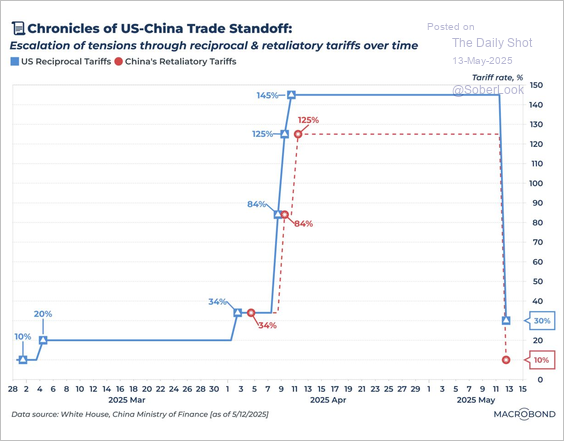
As such, while Wall Street analysts and economists were slashing economic growth and earnings estimates just a month ago, striking fear into investors' hearts, that has now reversed.
Recession Probabilities Are Falling
Following the announcements of trade deals with both the UK and China, recession probabilities for 2025 declined. Now, economists are rushing to reverse those previous recession calls.

The reality is that the onerous tariff levels initiated by the Trump administration were never permanent. This was a mistaken assumption by the mainstream media. Furthermore, the "inflation impact" from tariffs, which was expected to cause the recession, has yet to appear. Such is evident in both inflation reports this past week. The chart below shows the composite CPI/PPI index and whether inflation is above or below the long-term average inflation rate. Currently, inflation is 2% below its long-term average.

Inflation failing to appear is unsurprising and something we discussed in detail in "Tariffs Roil Markets." In their rush to undermine the current administration, the media also failed to consider two important facts we discussed previously.
"The first is that Trump’s tariffs are a 'stick and carrot' for negotiating an agreement with both Mexico and Canada. As you will see, all he wanted was assistance in securing the borders, reducing illegal immigration, and arresting the illegal flow of drugs, especially “Fentanyl,” into the U.S. Therefore, any assistance provided by Canada or Mexico would lead to a reversal of those tariffs. Secondly, we stated the market’s opening would likely be the worst level of the day, so any “panic selling” of positions early in the morning would likely be a mistake."
That same logic applies to China and every other country dependent on U.S. trade. Given that China depends on roughly $50 billion in annual trade (16.2% of total exports worldwide) to the U.S. for its economic growth, President Trump was correct in assuming he had a stronger hand in the negotiations.

With those tariffs vastly reduced, the risk of the recessionary impact from an excess "tax" on consumers is fading. However, even with the tariffs reversed, the economic data, while slowing, does not suggest that a recession risk is imminent.
A Recession-Proof Economy?
Doug Cass made a valid point this past week, asking if the "economy is now recession-proof."
"Is the economy now recession-proof? Is this also now a syntax question as opposed to a practical question?
By a syntax question, this is what I mean. Recession is measured by reported GDP and reported employment. GDP is in part a function of reported inflation. If inflation is understated, GDP is overstated by the same amount. Employment includes jobs going to immigrants, second jobs, jobs created by the birth/death model, and jobs going to government employees that often have negative productivity and whose roles (regulatory and bureaucratic nonsense) end up harming the country and the economy, even though they help GDP in the short term.
The country thought we were in recession in the middle part of the Biden term. This includes very prominent financial minds and the average Joe. There is a reason the election went the way it did: “It’s the economy, stupid.” But, as measured by the official stats, there was no recession, and things were pretty good. Now, we are still not in recession, and as measured by the same stats, it still seems 50% likely we will not be in recession, and if we ever enter one, it feels like it might be mild, at least as measured by those same statistics.
So, is the economy now recession-proof? If we don’t go into a recession now, with the shaky foundation that was in place, including an overspent consumer, all the debt, global tensions, and all the uncertainty, it feels like we will never have a recession."
It seems that way, but the one contributing factor that broke all pre-existing models was the flood of monetary and fiscal stimulus post the COVID pandemic. It may take us years to determine if the previous historical models and indicators, such as inverted yield curves, ever function as they did previously to gauge recession probabilities. Maybe they won't.
However, as noted above, economists are rapidly reversing their predictions about the recession and now suggest that President Trump's actions, while previously thought to be an economic disaster, might be beneficial. Furthermore, financial conditions are improving, which also supports economic activity. If that trend continues, particularly if the Fed resumes cutting interest rates, it should start to feed into consumer confidence. If consumer confidence strengthens, which would be logical following recent tariff resolutions, this should reduce recession probabilities further.

Understand the message here. As discussed two weeks ago, the economic growth rate is slowing, but recession probabilities remain low.
That does not mean that a recession is permanently avoided.
However, therein lies the problem with recession probabilities and predictions in the first place.
The Problem With Recession Predictions
It is wise to remember that in 2022, we had the most anticipated recession, which failed to occur and preceded one of the strongest bull markets in recent history.
The problem with predicting recessions is that economists always work off lagging economic data. Such is particularly the case with GDP, which is revised three times following the end of the quarter, 12 months, and 3 years later. Historically, given that lag, the timing of U.S. recessions can be off by 9 to 12 months before they are recognized by the National Bureau of Economic Research (NBER). The chart below shows the lag between the onset and recognition of previous U.S. recessions.

The following table better shows the lag between the start and recognition of previous U.S. recessions. I have also noted the impact on financial markets as investors reprice earnings growth for a reversal in economic growth rates.

Investors must decide whether the current correction is “just a correction” or whether the risk of a U.S. recession is increasing.
Currently, few indicators suggest recession probabilities are rising. The Economic Composite Index (a comprehensive measure of economic activity comprised of more than 100 data points) is in expansionary territory. The EOCI index confirms the improvement in the 6-month rate of change in the Leading Economic Index (LEI), one of the best recession indicators, and current levels of economic growth. While economic growth will undoubtedly slow as all of the excess governmental spending under the previous Administration reverses, there is currently no recession warning in the data. That does not mean that it can not change in the future. However, for now, the risk of recession is extremely low.

Adding to that analysis, the economically weighted ISM composite index is also in expansionary territory, suggesting no current risk of recession. This composite index (80% service / 20% manufacturing) is why we wrote that there was no recession risk in 2023 or 2024 despite inverted yield curves.

Lastly, Government spending remains robust, which fuels economic growth. While the current Administration is looking to cut spending and reduce the deficit, which would weaken economic growth rates, they are making very little headway.

Furthermore, despite the hopes that DOGE would cut Federal spending, it has only returned to the post-financial crisis exponential growth trend as the Government continues to use “Continuing Resolutions” to fund the Government. These resolutions automatically increase government spending by 8% annually. In other words, spending doubles every nine years, so debt levels continue to rise, feeding into economic growth rates.

Conclusion: Staying Grounded Amid Market Volatility
While recession probabilities have resurfaced in the headlines following the recent market sell-off, the economic data does not yet support the narrative of an imminent downturn.
As I discussed in “The Risk Of Recession Is Not Zero,” the government is currently engaged in activities that will impact economic growth. If those actions are combined with those of an already struggling consumer, the risk of recession will undoubtedly increase. Thus, economists are now scrambling to reverse their recession calls.
Historically, recession calls tend to be premature, often relying on lagging indicators that confirm economic contractions only well after they have begun. Current indicators point to a slower economic expansion, not contraction. Although growth is slowing, a slower growth environment does not equate to a recession—a distinction investors must keep in mind.
The more significant concern for markets is the inevitable impact of slowing economic growth on corporate earnings expectations. With analysts projecting continued double-digit earnings growth into 2026, there is an apparent disconnect between these forecasts and the economic reality. History suggests that earnings will eventually revert to levels that align with economic activity, which could lead to further bouts of market volatility.
For investors, the key takeaway is to stay informed, focus on fundamentals, and avoid being swayed by short-term noise. While volatility and corrections are natural in market cycles, history shows that panic-driven decisions often lead to missed opportunities. As long as economic indicators remain expansionary, the risk of a recession remains low, though careful monitoring is warranted. Investors should continue to assess their portfolios, manage risk prudently, and position themselves for a gradual slowdown rather than an economic collapse.
How We Are Trading It
As noted last week, we continue to manage our portfolios in a manner that allows us to participate in the market while still hedging against underlying risk. As such, we have started rebalancing risk as necessary and adjusting portfolio holdings to improve relative market performance. Notably, the breadth of the market has improved, but as noted above, the short-term overbought conditions suggest the "easy money" has been made. We will wait for corrections to reduce cash balances further and remove portfolio hedges entirely. That is, of course, unless some other unexpected event surfaces that substantially increases market risk.
As noted, while the risk of recession has fallen, recession probabilities are not zero. As we said in Friday's Daily Market Commentary:
"However, patience will likely pay off here. As noted previously, we are still on a weekly sell signal, which has historically led to short-term market underperformance. As shown, previous periods of historical weekly moving average crossovers typically involve a more extended period of consolidation or corrective price actions. The main exception to that rule was 2020, when the Federal Reserve intervened with massive monetary support. With yields rising and the Fed on hold, no excess support is coming into the market other than a surge in corporate buybacks. However, those are due to decline starting next month."

Continue to follow the rules and stick to your discipline. (Read our article on “What Is Risk” for a complete list of rules)
Have a great weekend.
(Note: The allocation below contains a 5% short S&P 500 position in the ETF allocation.)

Feel free to reach out if you want to navigate these uncertain waters with expert guidance. Our team specializes in helping clients make informed decisions in today’s volatile markets.
Research Report

Subscribe To “Before The Bell” For Daily Trading Updates
We have set up a separate channel JUST for our short daily market updates. Please subscribe to THIS CHANNEL to receive daily notifications before the market opens.
Click Here And Then Click The SUBSCRIBE Button
Subscribe To Our YouTube Channel To Get Notified Of All Our Videos
Bull Bear Report Market Statistics & Screens

SimpleVisor Top & Bottom Performers By Sector

S&P 500 Weekly Tear Sheet

Relative Performance Analysis
Unsurprisingly, after the pervasive rally over the past week, almost every major market and sector is now extremely overbought. With recession probabilities falling sharply, the rush to regain equity exposure has forced ongoing short-covering. However, it is unlikely the market will be able to push much further without a short-term correction or consolidation to relieve some of that overbought condition. Take some profits, rebalance risks, and look for a pullback to reduce hedges and add exposures.

Technical Composite
The technical overbought/sold gauge comprises several price indicators (R.S.I., Williams %R, etc.), measured using “weekly” closing price data. Readings above “80” are considered overbought, and below “20” are oversold. The market peaks when those readings are 80 or above, suggesting prudent profit-taking and risk management. The best buying opportunities exist when those readings are 20 or below.
The current reading is 69.06 out of a possible 100.

Portfolio Positioning “Fear / Greed” Gauge
The “Fear/Greed” gauge is how individual and professional investors are “positioning” themselves in the market based on their equity exposure. From a contrarian position, the higher the allocation to equities, the more likely the market is to be closer to a correction than not. The gauge uses weekly closing data.
NOTE: The Fear/Greed Index measures risk from 0 to 100. It is a rarity that it reaches levels above 90.
The current reading is 69.35 out of a possible 100.

Relative Sector Analysis

Most Oversold Sector Analysis

Sector Model Analysis & Risk Ranges
How To Read This Table
- The table compares the relative performance of each sector and market to the S&P 500 index.
- “MA XVER” (Moving Average Crossover) is determined by the short-term weekly moving average crossing positively or negatively with the long-term weekly moving average.
- The risk range is a function of the month-end closing price and the “beta” of the sector or market. (Ranges reset on the 1st of each month)
- The table shows the price deviation above and below the weekly moving averages.
The "relentless rally" continued this past week and has pushed most markets and sectors well above their normal risk ranges. That rally in equities has come at the expense of gold, gold miners, and bonds, which we previously warned would be the case. However, given the more extreme short-term overbought conditions, investors should look for a correction over the next week or two to relieve some of that pressure. However, that dip should likely be bought particularly if supports hold at the 200-DMA.

Weekly SimpleVisor Stock Screens
We provide three stock screens each week from SimpleVisor.
This week, we are searching for the Top 20:
- Relative Strength Stocks
- Momentum Stocks
- Technical Strength W/ Dividends
(Click Images To Enlarge)
RSI Screen

Momentum Screen

Technically Strong With Dividends

SimpleVisor Portfolio Changes
We post all of our portfolio changes as they occur at SimpleVisor:
May 15th
This morning, we took some profits in our energy positions, coinciding with the crude oil price bump. Our concern is that oil prices will head back lower due to “drill baby drill” policies, OPEC policies, and a weakening economy. While we reduced the total energy exposure, we did add to OKE (up to 2%), as it is a natural gas pipeline company and less impacted by lower crude prices. We added a 1% position in AMLP, an ETF holding pipeline stocks. It pays a nearly 8% dividend. While we prefer OKE, it does help align the exposure in the sector model more closely with the equity model.
Equity Model
- Sell 100% of XOM and FANG
- Increase OKE to 2% of the portfolio.
ETF Model
- Sell 100% of iShares Energy ETF (XLE)
- Add 1% of the portfolio to AMLP
May 16th
In early April, we reduced our exposure to healthcare stocks as the threat of tariffs loomed large. With that threat largely mitigated, and the recent executive order on drug pricing being more “bark than bite,” we are starting to rebuild our positions at better prices. Today, we are increasing our current exposure in AbbVie (ABBV) and Eli Lilly (LLY) in the equity model, and adding to the iShares Healthcare Sector (XLV) in the ETF model.
Equity Model
- Increase ABBV to 3.5% of the portfolio and LLY to 2.5%.
ETF Model
- Increase XLV to 7% of the portfolio.
Lance Roberts, C.I.O., RIA Advisors
The post Recession Probabilities Decline appeared first on RIA.
-
Site: RT - News
The reduction comes shortly after the Treasury secretary warned of a possible default by the end of summer
Moody’s has stripped the US of its perfect triple-A credit rating, citing increasing concerns over debt affordability. The rating agency had held the country’s sovereign credit rating at the highest possible level since 1917.
The move brings the 116-year-old agency into line with its global rivals. Fitch Ratings downgraded the US rating to AA+ from AAA in August 2023, and Standard & Poor’s cut it to AA+ from AAA in August 2011.
The reduction to Aa1 “reflects the increase over more than a decade in government debt and interest payment ratios to levels that are significantly higher than similarly rated sovereigns,” Moody’s said in a statement released on Friday.
The agency noted that successive US administrations and Congress have failed to reach an agreement on measures to reverse the pattern of large annual fiscal deficits and rising interest costs.
Moody’s stated, however, that the US retains exceptional credit strengths, citing its size, resilience, dynamism, and the role of the dollar as the global reserve currency.
Earlier this month, Treasury Secretary Scott Bessent warned about the possibility of a default as soon as August, calling for either raising or suspending the debt ceiling – a statutory limit on how much the federal government can borrow – to avoid running out of money to cover federal expenses.
Read more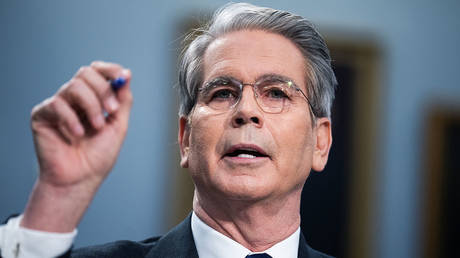 US could face default by August – Treasury chief
US could face default by August – Treasury chief
The US reached its ceiling of $36.1 trillion in January. Once the limit is hit, the government is legally barred from borrowing further to meet its obligations. The total federal debt has climbed to $36.2 trillion, according to official figures.
The Treasury has avoided default by using so-called “extraordinary measures” – mainly accounting maneuvers such as suspending contributions to federal employee retirement funds – to keep up with its financial commitments.
Under former President Joe Biden, the debt ceiling was raised three times. The current president, Donald Trump, has argued that the cap should be eliminated entirely, calling it pointless if it’s routinely lifted. He has argued that the concept of a debt ceiling “doesn’t mean anything, except psychologically.”
Commenting on the rating downgrade, White House spokesperson Kush Desai said on Friday that Moody’s “would not have stayed silent as the fiscal disaster of the past four years unfolded” if the agency “had any credibility.” He also claimed that the Trump administration is currently dealing with the “mess” left by the previous administration.
-
Site: Catholic ConclaveBecause, as Perón said, "we are all Peronists," and, as Bergoglio said, "every person is a child of God."Perón and Bergoglio's greatest enemies were the same conservative military officers and cardinals who had given them the opportunity to govern.As often happens with deaths, I inevitably thought of Pope Francis, a person who hadn't interested me much while he was alive. For those of us who are Catholic Conclavehttp://www.blogger.com/profile/06227218883606585321noreply@blogger.com0
-
Site: Crisis Magazine

There have been so many dark centuries in the history of Christendom that one hesitates to call any particular century the darkest of all. Some have been as dark as the 20th century, but none have been as deadly. In terms of the sheer body count, the 20th century, with its wars of irreligion and its access to industrialized weapons of mass destruction, is the most murderous in human history.
-
Site: RT - News
European NATO members have no idea whether the US president is ready to be tough on Russia, the outlet claims
European NATO members are “frustrated” with US President Donald Trump’s “constant swerving” on Ukraine peace talks, which they believe undermines their ability to pressure Russia, Bloomberg reported on Friday, citing sources.
Kiev’s backers are uncertain regarding what Trump will do following the inconclusive Turkish-mediated talks between Russia and Ukraine in Istanbul on Friday, according to the news agency. The meeting was the first direct engagement between the belligerents since 2022.
Key European NATO members initially believed that Trump supported their plan to impose new sanctions on Russia if it rejected the demand for a 30-day unconditional ceasefire with Ukraine, the article said. Moscow has stated that it is open to a ceasefire “in general,” but has expressed concern that it would only give Ukraine time to regroup and rest its battered forces.
Read more Russia ready for ‘possible compromises’ – Putin aide
Russia ready for ‘possible compromises’ – Putin aide
However, the West’s unified front apparently started to crumble after Moscow proposed direct Russia-Ukraine talks in Istanbul without any preconditions, according to Bloomberg. The overture prompted the US president to insist that Kiev “immediately” agree to restart dialogue, despite Vladimir Zelensky’s reluctance to do so without a ceasefire.
One European official expressed hope that the Istanbul meeting would “make it clear to Trump that the Russians aren’t serious about peace talks,” prompting the US to respond decisively. Some European leaders reportedly believe that Trump may still follow through on earlier threats to impose secondary sanctions and banking restrictions on Moscow.
Others, however, are said to be skeptical about whether Trump – who has repeatedly said he wants to meet with Russian President Vladimir Putin to settle the Ukraine conflict – has an appetite for drastic measures.
At the Istanbul meeting, discussions included ceasefire options, a prisoner exchange, and plans for a potential follow-up meeting. Vladimir Medinsky, Russia’s top negotiator, said Moscow is “satisfied” with the results of the Istanbul talks and is ready to “resume contacts” with Kiev.
Russia has stated that the Ukraine conflict could be settled if Kiev commits to permanent neutrality, demilitarization, denazification, and recognizes the “territorial reality on the ground.” Kiev, however, has ruled out any territorial concessions to Moscow.




